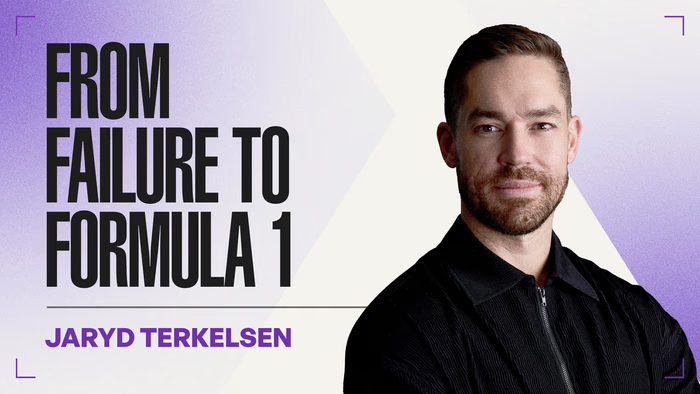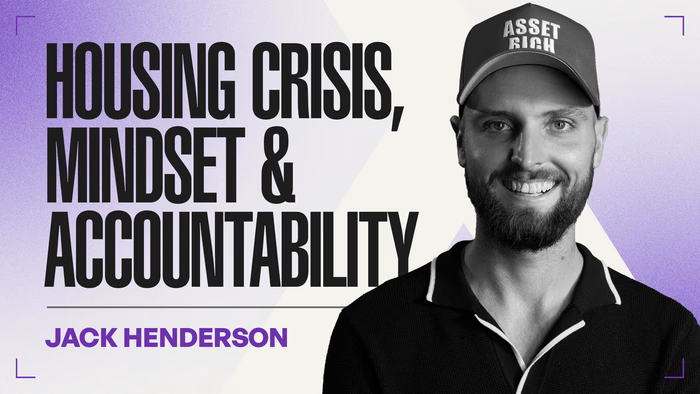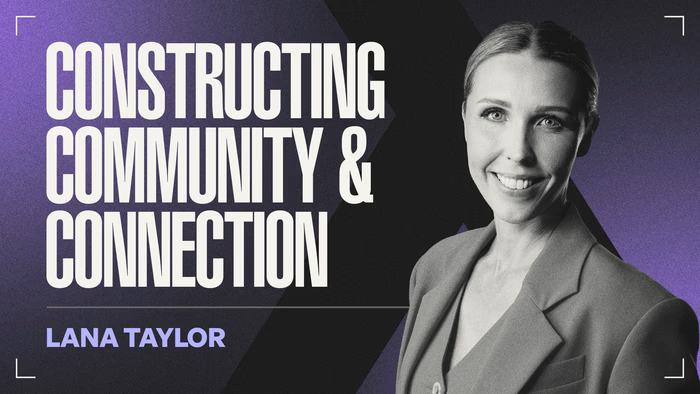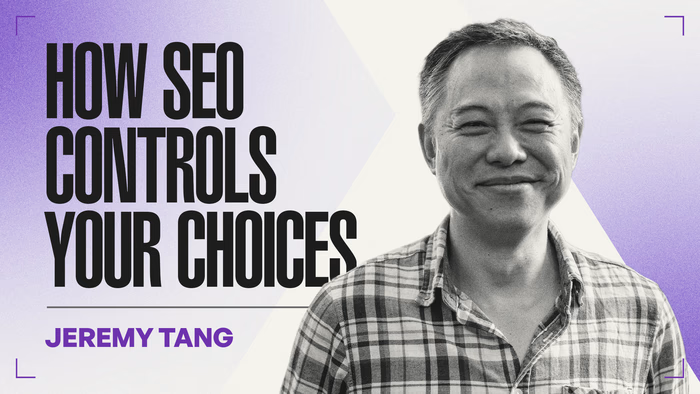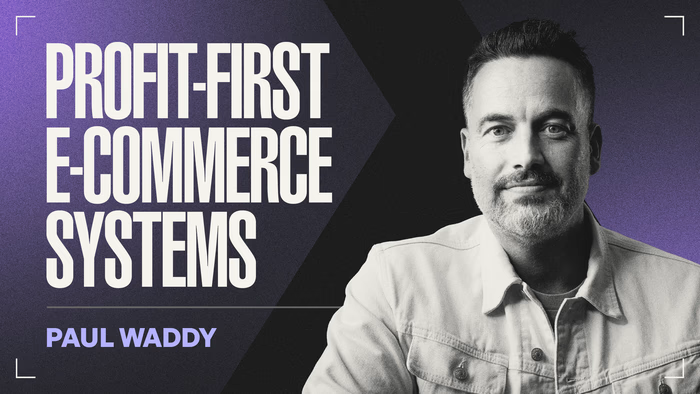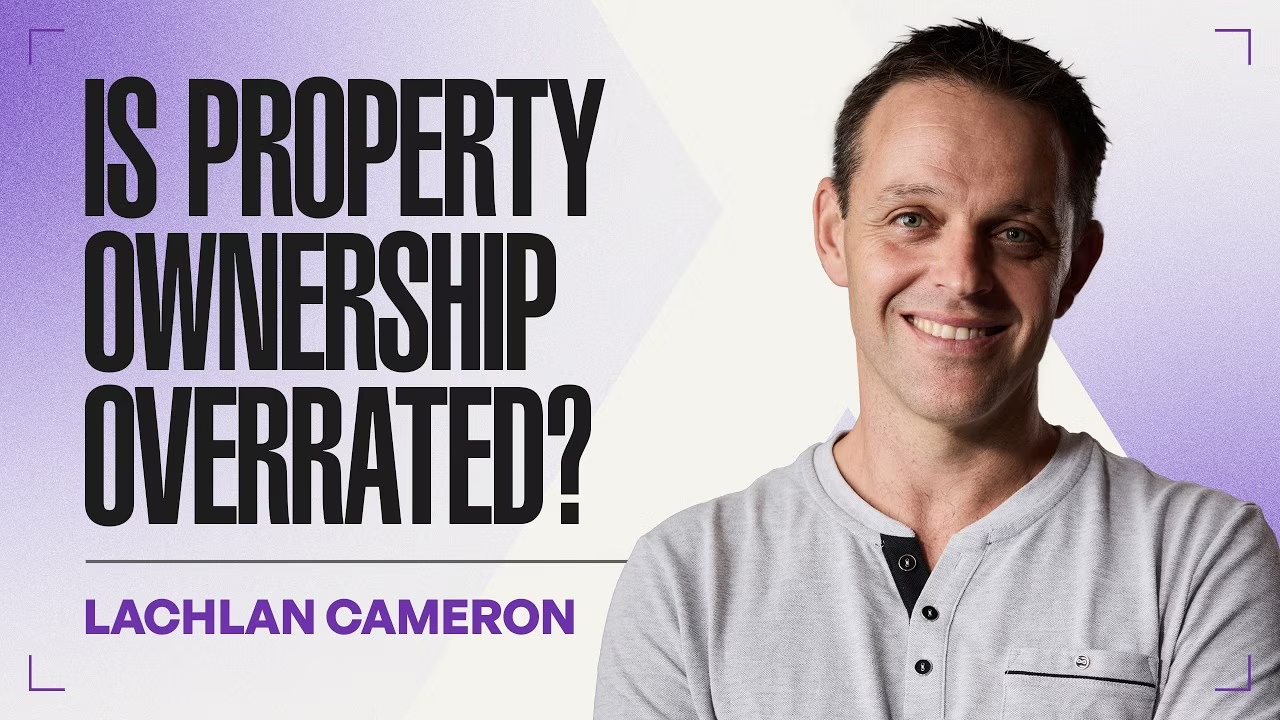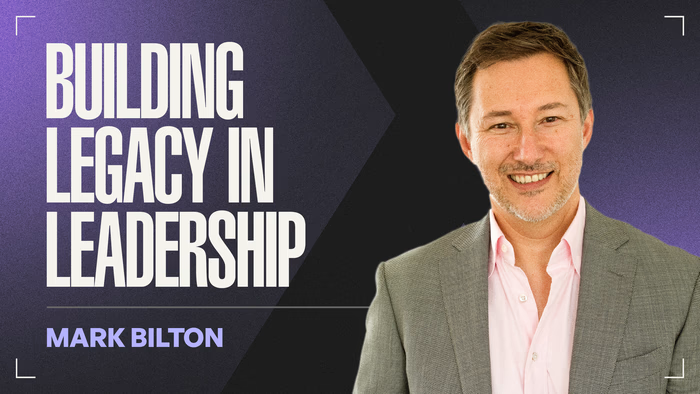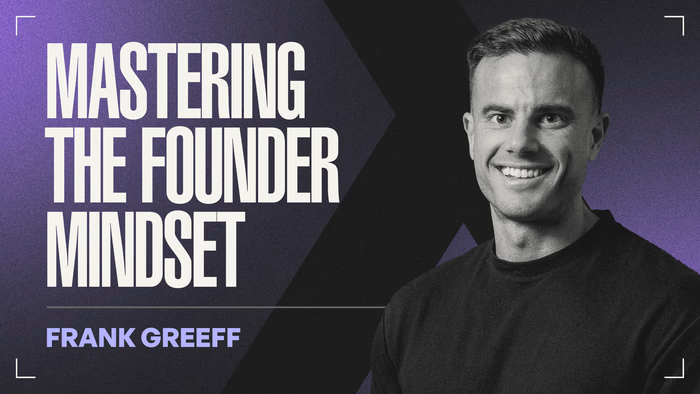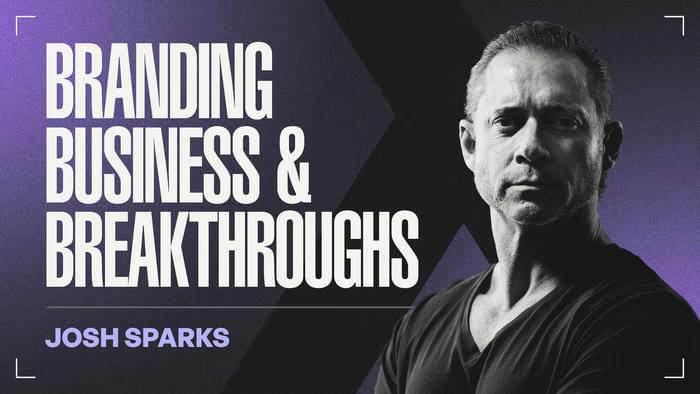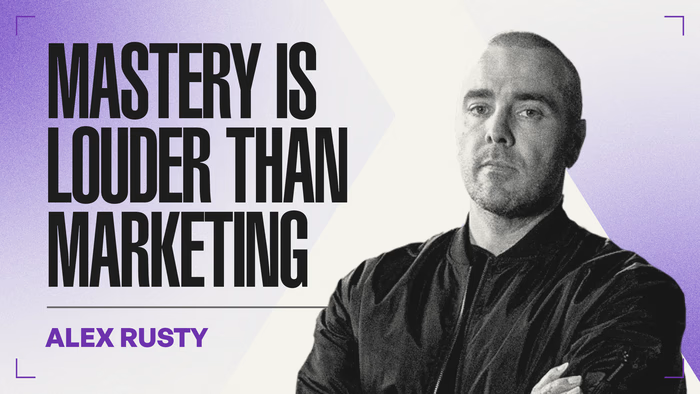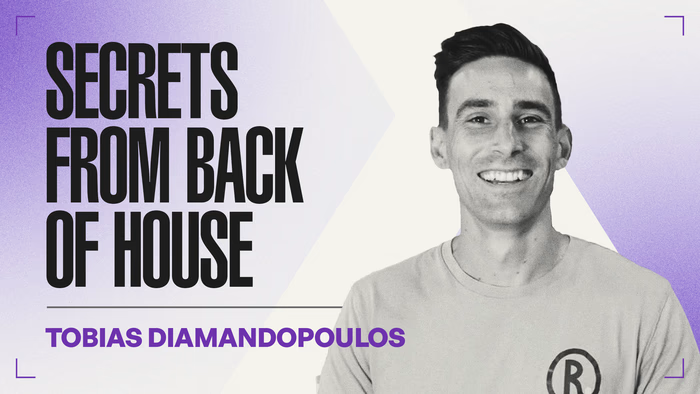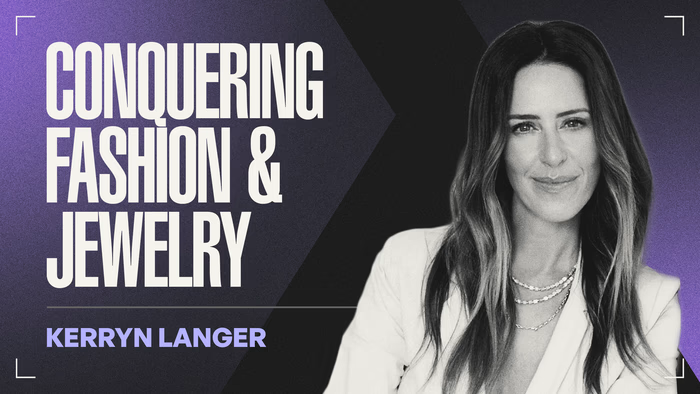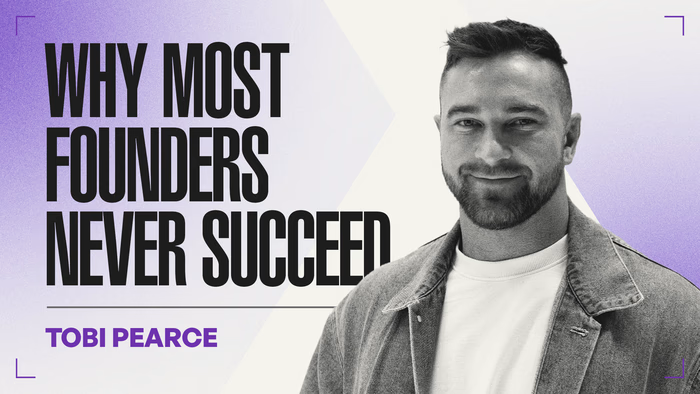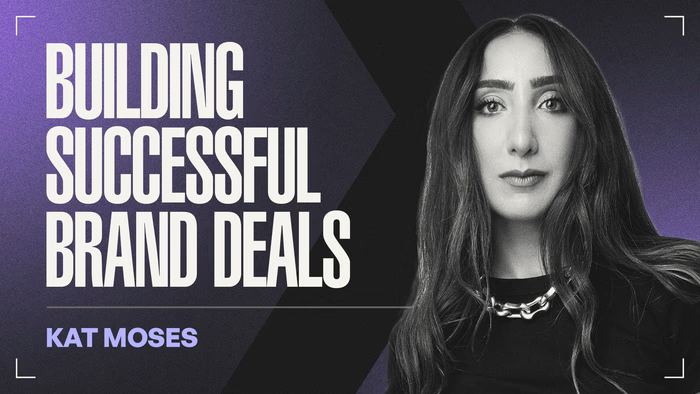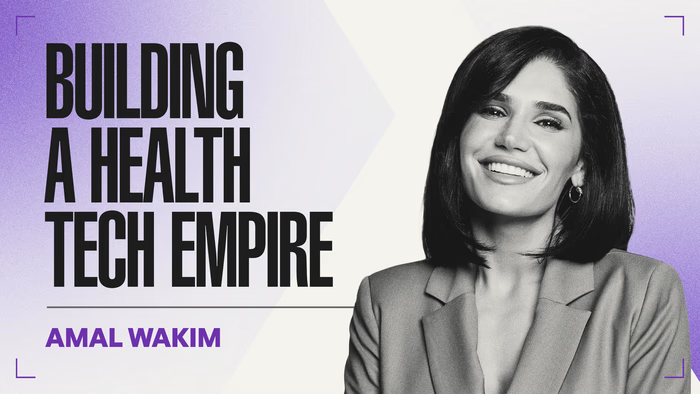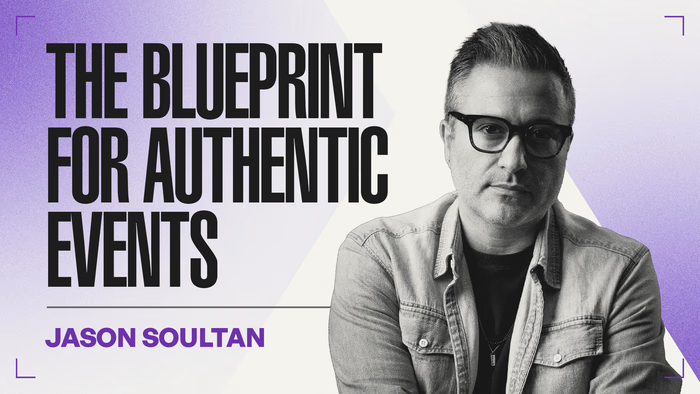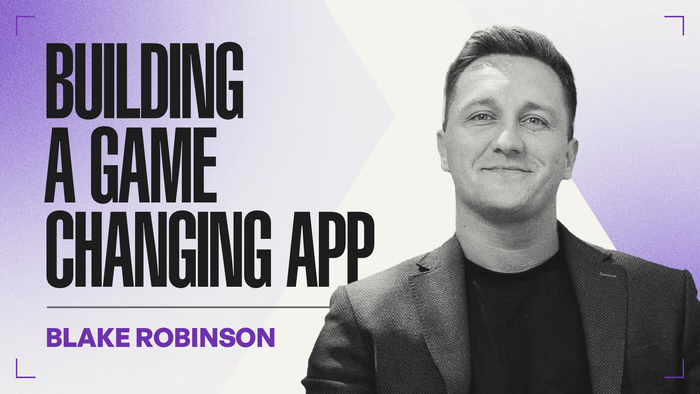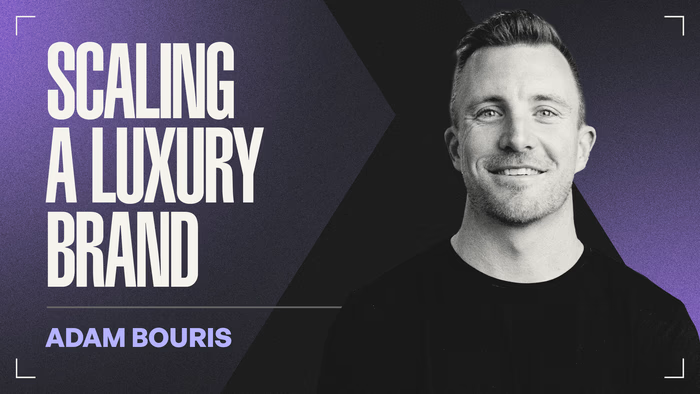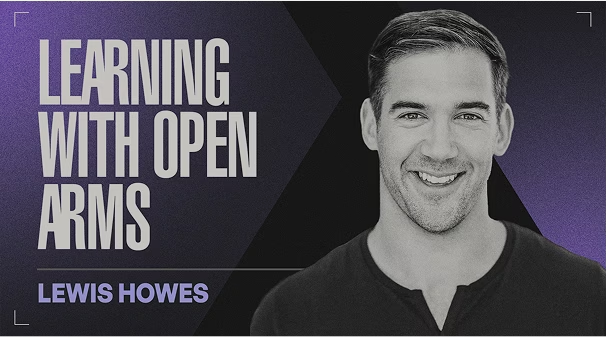


TLDR
Summary
Chad Cohen, founder of Fortem Media and Unofficial Run Club, is an expert in creating brand narratives that achieve significant market visibility. He specializes in developing brands through cut-through content and strategically led storytelling, focusing on cultivating genuine communities and true fans. As a seasoned marathon runner who competes globally, Cohen brings a unique, high-performance perspective on the necessary discipline to build trust at scale. The conversation focuses on the practical mechanics of community-led brand building, the storytelling frameworks essential for driving engagement, and the long-term thinking needed to achieve distinction in an oversaturated digital space.
Highlights
- Key Ventures: Founder of Fortem Media and Unofficial Run Club.
- Core Expertise: Building brands using cut-through content and strategically led storytelling.
- Goal: Growing authentic communities and cultivating true fans.
- Unique Perspective: Leverages his experience as a seasoned marathon runner to understand the discipline required for building trust at scale.
- Key Themes Explored:
- Mechanics of community-led brand building.
- Storytelling frameworks that drive engagement.
- The long-term thinking required to succeed in a saturated digital landscape.
Transcript
00:00:01 - 00:00:54
I truly believe if you're not willing to take risk, you won't cut through it in today's market. And risk to me in this is if you're sitting around the table with your content team or your internal team and you're like, "Holy [ __ ] this could rustle some feathers and this may not work." That's probably the right idea. Chad Cohen is the founder and CEO of Fordm Media and the creator of Unofficial Run Club. From running ultramarathons to crafting cinematic brand stories with Chad Blend's creative
00:00:27 - 00:01:30
vision and powerful storytelling to build brands that move people. You no longer are necessarily a small fish in a big sea. Like you can have one really clever idea. You no longer have to have crazy budget or crazy talent. Anything can work. You just have to try. Learn about the person that you want to connect with. Close mouths don't get fed. do something different and memorable and find an exchange of value. If you can find a way to drive real value, then I think you can very quickly get into rooms that you never imagined
00:00:59 - 00:02:11
you could have. What do you think you're really chasing? I'm chasing the life that I've worked so hard to deserve. And I think that won't change for a long time and if ever. When you see people make content around storytelling, what are the main things that you see that they often get wrong? I think the most surprising thing has been [Music] this episode is brought to you by Wick Studio. So you've been known to share this principle which you kind of live by which is called um document and share as
00:01:39 - 00:02:28
you go. I understand that you've kind of homage that from Gary Vee, but can you take me into that? Like take me into the practice, the day-to-day like where does that come from and and what is it that you're trying to create? For me, as a very young kid, I always had this idea that I wanted to live life on the leftand side of a menu and not worry about the right hand side. And what that meant was if I wanted to experience something or enjoy something, I never wanted to look at how much it
00:02:04 - 00:03:02
costs. And obviously when I was younger, that was quite heavily monetary driven. But that's shifted quite dramatically as I built Forom and as I built unofficial with the rest of the crew. And now what that's meant for me is like I really want to be able to create these experiences and stories and what better way to demonstrate that that can be done by just documenting what I do. And I'm grateful that I have the ambition and drive to build something. And I think if I zoom out and look back at when I was
00:02:33 - 00:03:30
13, when I started my first business, I didn't have that someone that I looked at to be like, "Oh [ __ ] like that guy is living his life and I can actually see what he's doing in his dayto-day to get to where I aspired to be." And so a lot of it is homage to me as a kid and documenting and telling that story. Um, so that there are or if anyone's interested out there, they can kind of find some nuggets outside of just the really educational knowledgebased stuff. And then I think to deeper f and further
00:03:02 - 00:04:10
answer your question just around like what does that look like in the dayto-day the biggest thing I've or the biggest shift in my mindset was and this is something I'm genuinely grateful about and for is that like I do live a very interesting inspiring amazing life and of course I have challenges but like why not document it and why not just open up and let people see what I do which was very hard at the beginning and the response has been so um inspirational to me because it's reminded me that in times where like I
00:03:36 - 00:04:24
have to keep showing up and I've known that for six and a half years building this thing, but now I actually have to continue to keep showing up because I know that there's an audience that wants to continue seeing the story. So I think there's two parts. It's one, it's about just being able to like authentically be myself and tell a sto a true story of what I'm trying to build and doing it for the right reasons in terms of like I'm not trying to get brand deals on my
00:04:00 - 00:04:51
vlog. I'm I I I want to show brands what I truly believe in, which is building a life of stories. And I think that that's slowly, we were talking just before jumping on this, but I think that's slowly becoming apparent in what we actually do for our clients, which is I feel like form tells great stories. And whether that be through brand, through design, through the websites we create, the content we create, the goal for us is how do we authentically tell the world your story. And I think if we can
00:04:25 - 00:05:29
work together to nail that, that's where the real juice is. And what better way to show that by doing that for myself and then I can go to clients like I'm doing it for me and this is what's happening. You should try it for yourself. And I think it's partly partly clients, partly the young kid who wanted to be able to watch something not just educational but informative and in a documentary style way where I feel like I'm as we discussed before more of like a conversationalist than a this is how
00:04:57 - 00:05:57
you do things. And so taking someone on that journey for me is what I would have liked to receive when I was a kid. Wow. And who was that person for you? and take me into that moment when it really started to resonate. Um, who was the person for me that I looked up to? Yeah, the person I mean that in the content documenting and um, storytelling way was definitely Gary Vee. Um, I think Gary was a pioneer for the concept of like creating one big piece of content and then cutting that down into a whole
00:05:27 - 00:06:29
amalgamation of different pieces. Um, and he was someone I guess as a young kid when I was strangely ambitious cuz I looked at my peers and I was like, "How come on a weekend you want to play games and I want to write business plans?" Or, "How come on the weekend you want to um spend, you know, go to the shops and walk around and I want to like create something?" And so I felt a bit weird, but Gary Vee was the guy who told me that I should just follow my dreams. and it was the guy who I'd like look at and
00:05:58 - 00:06:58
okay cool now someone gets me and I still haven't met him I want to meet him. Um but that he was someone that I so strongly resonated with and I look at what we're doing as a company now and so much of what he put into the world 15 20 years ago is still so relevant today and I think yeah if there was anyone that I called out in terms of getting me going it would be him. I I I like how you spoke about the feeling that someone gets me. Now, when most people look at content and let's say someone's at the beginning of their
00:06:28 - 00:07:20
journey to produce media and document and share what they're doing, what exactly is taking place? Because if you're producing media and someone's consuming it and they feel like this person gets me, even though they've never met them, what's really happening? I think it's in that moment it's authentic connection to what the person is or what the brand is and someone feeling aligned with the values and morals and the way in which a brand wants to show up in this universe
00:06:54 - 00:07:56
like they see the world the way I see it correct and I think it's a lot a lot of it is around like I feel you like it's a feeling it's like I don't connect with this brand because I don't really like the way they did that but I connect with this brand cuz like that was really cool and cool to me and cool to you are two different things. And I think that's where the interesting I guess culmination of all the different ways that you can tell a story comes into play and what you do for this brand
00:07:25 - 00:08:12
and what you do for this brand or as an individual and an individual and how you tell those two stories can be completely different, get the same result or get the completely different result and even speak to different people. And I guess throughout the journey, I've just realized like you don't have to speak to everyone and not everyone's going to be your person, but if you resonate with what I'm doing and I resonate what you're doing, there's connection, there's energy, there's a story that's
00:07:48 - 00:08:41
to be told and there's there's like fandom, like there's there's an affinity between the two of us. And if that's on a personal relationship level or on a business relationship level, I think that's where it drives value. And so storytelling to me and the ability to pull people into the content that's created or the brand that's created is like who are you genuinely as a person or as a brand and who are your people genuinely and then yes there'll be peripherals of like people that are kind
00:08:15 - 00:09:07
of like could I be like that the aspiration which I think is massive in storytelling but like if you can nail that connection I think that's where the magic is. Now, when people are trying to create some kind of connection with their audience, a few roadblocks might get in the way. And one which I've identified is that people try to go, well, I'm trying to speak to everyone, and I don't want to turn anyone off. What's your take on this? And how should people look at creating media regarding
00:08:41 - 00:09:30
who they're making it for? I truly believe if you're not willing to take risk, you won't cut through in today's market. And so, you're not going to please everyone. And risk to me in this is if you're sitting around the table with your content team or your internal team and you're like, "Holy [ __ ] this could rustle some feathers and this may not work." That's probably the right idea. And that's how we look at it. And that doesn't mean that you
00:09:06 - 00:09:53
have to be incredibly risky at a massive corporate level. But I think riding that line and being like, "This could go one way or the other way," I think is where you get cut through. But it's also where you get your true fans. When you say true fans, what exactly does that mean? You'd probably know this better than me because I've forgotten what article it was, but there's an article about thousand true fans. Oh, Kevin Kelly. There you go. That's like what I look at
00:09:30 - 00:10:21
and I reference so often. It's like if you have your thousand true fans, you can build an incredible brand, an incredible business, etc. And when I talk about a fan, it's like someone who deeply resonates and connects with what story you're putting out into this world. And so when it comes to like a brand taking risk, it's risk that someone won't like your story or someone won't resonate with what you do. But I truly believe that for every person that doesn't resonate with what you do,
00:09:55 - 00:10:42
there'll be two people that do. And focus on speaking to those people until those people really wish like they were those people. And I think that that's the energy. It's a beautiful way to contextualize it and understand that there's an energy exchange when you're sharing stories and when you're sharing media. just to I guess add some measure to some of the the things that we're going to talk about today. One which is storytelling, the second of which is being authentic.
00:10:19 - 00:11:22
I I hear the word authentic being used quite often. And I think that there's a lot of different terminologies and interpretations of what that means. When it comes to storytelling, what do you mean by being authentic? And when it comes to storytelling, what makes a good story? Absolutely. So from an authentic perspective, I think being authentic in a sense of storytelling is people in today's times consume so much media and have such a vast understanding of what the market is and the market
00:10:50 - 00:11:46
isn't that if you're a fun, playful brand and you put out something incredibly serious, it's not going to feel right. Like it's just not what people would call on brand. And then you can say, well, like was it like a gorilla tactic to come out and do something different? And I think that that's, you know, a later a later podcast episode. Um, but I think authenticity is like what what what are you and who are you as a brand? And then how do you put that out into this world? And if you're a really serious
00:11:18 - 00:12:12
straightedged law firm, I would actually recommend you don't go straightedged with your content or your storytelling. But there's parameters at which you need to play and at which the world expects of you. And so to be authentic, I think it's really comes down to like that connection that values like who are you as a company and as a brand and as an individual and then how do you put that out into the world. So an example of that and being authentic is a lot of my vlog content is incredibly polished and
00:11:45 - 00:12:39
often we toy with the concept of do we put it out in a really polished way and back and forth has happened consistently and because forom sells really well polished content we've landed yes it's important to keep going in that direction but we also want to show what's authentic to me which is just like real raw stories of what goes on behind the scenes so it's a mix of those two things but when my team asks me to do an end ofear a speech and they print me notes to thank this person and that
00:12:12 - 00:12:59
person, I get nervous and I don't want to I I find it really hard to do that speech because it's not authentically me. Authentically me is actually just standing up and talking and engaging in each person and thanking them and looking at them straight down the barrel and being like, "Thank you so much." And that then goes through into the storytelling. So people very quickly can tell what is and isn't authentic you as a person or as a brand. And I think the brands that are doing it the best are
00:12:36 - 00:13:28
the brands that are authentically the people behind the brand. And that's what I think it means to be authentic in storytelling. So like rather than fabricating and trying to stitch something together that you think the market would like for some said reason, it's showing up with a real story that is actually taking place. 100%. I think you look at the likes of George Hedon from Represent and how long they've been building their business and their brand. You look at someone like Bruno Kasanovas, Nude Project. He's
00:13:02 - 00:13:54
doing the same thing. They're all vlogging and creating these stories that are so authentically themselves. Like George's dad was a mechanic in a workshop for Rolls-Royce. George now lives in LA with two Rolls-Royces in his garage and loves like the old school cars and that comes through in his campaigns. Um, they love UK rock and they've doing collaborations with rock bands. like it's so authentically them that they so passionate about what they do that their audience then feels that
00:13:28 - 00:14:17
through the storytelling. What would you say to those people that don't think that they have any novelty or they have anything of interest? They they they would say to themselves that I'm quite bland and I'm not sure that anyone would find me interesting. Yeah. Um I mean I hear I hear that so often. It's actually like one of the the questions I ask in interviews is around like what do you do outside of work and what makes you interesting? Um, and often people are like, which I would
00:13:53 - 00:14:56
never say in an interview, but like I'm bland, I'm boring, I don't have a story. And I think you'd be surprised how interconnected this world is today. Everyone has a story. Like there is something that is going on in your head that you can put out into this world that there are 100% people that you can connect with that are interested in what you do. What do you think makes a good story? I think topically if we talk about breaking a story down I think the core is that authenticity like there needs to be
00:14:24 - 00:15:18
something real there something people can connect with and the next thing for me is like the journey it's around like how do you take someone on a journey to invite them into your world and explain like this is what I'm doing this is where I'm going and this is how I'm going to try and get there and then there's obviously ly like the stereotypical like does that moment happen or does that moment not happen and then what's the flow on effect of that and as I said I'm not the biggest
00:14:51 - 00:15:49
like logical this is the template to how to do these things but I feel like where we've seen the most value both on a personal level and on a form level has been through taking individuals on that journey of like this is the brand this is what they're creating this is the behind the scenes of it coming to life introducing a character okay Well, what does this character do? Okay, taking that character on the journey. Is that character now a part of the brand? Yes or no? If they are, then what does that
00:15:20 - 00:16:10
character mean for the brand and building that out so that people are so bought into this journey that when you want to sell something or get people to commit to something, they're like, I'm so connected because I want to be involved and connected to the next stage of what this journey is. And then I think there's the flow on or the tail effect of like a story that then feeds through into like the everyday living or the everyday always on brand stuff in story like the stories through everyday
00:15:45 - 00:16:37
always on and then it's got to you need that next moment of like keep it relevant keep it fresh to keep people engaged and what's that new journey and so I see that um one of the really good examples that we've had recently from a form front is we launched a restaurant in a back lane in behind station if you've you've never walked in this lane it's behind the ivy it's like there's rubbish dump like rubbish bins there. It's like completely off-grid, right? And Sharon, who's the owner of the
00:16:11 - 00:17:08
restaurant, was like, "I've come to Forom because I want you to tell our story." I'm like, "What's your story?" So, it's an Italian restaurant. They serve really good food for not crazy prices, corporate, but also like fun on weekends. Um, Chad, help me bring this to life. So we engaged a non and we hired a granny to come in and be a part of the campaign and yell and ammo and put her fingers in the stuff in the kitchen and we built this whole story about non to the point at which people
00:16:39 - 00:17:36
come into the store after seeing our campaigns they booked out all the time I can get you a spot if you need um but people walk into this restaurant and ask is Nona here today right and that to me is good storytelling it's taking people on the journey introducing new characters doing something fun doing something disruptive and then tying that through into what you consistently do as a brand or as an individual to keep people engaged. Wow. And so you're trying to, as you said, build this world by which you can
00:17:07 - 00:18:08
feel like you're participating in 100%. And on a personal level, I think the the the steps or key things around storytelling and I think what's working most right now is people feeling the honesty and the truth behind the lens. So for a long time you had a wave of influencers storytelling on Instagram like here's a product this is what this is what the product is and people are so far past that they actually want to know like does the influencer really use that product and people start asking
00:17:37 - 00:18:27
questions so from a personal brand perspective and storytelling similarly like what we're doing in my vlog like it's not always about the fact that I run over the marathon and I've got a PB it's about the fact that I was injured 3 weeks before the marathon and what did I do and who did I see and how did that work and what was my mental state like like people want the detail and I think giving people as much detail that the balance between detail and a bit of elusiveness is also really interesting
00:18:03 - 00:19:03
in storytelling and that's a bit of a pushpull and we play with that a lot. What do you mean by uh elusiveness? I think just not all the details all the time and I think there's like intentionally leaving gaps. Yeah, I think like you don't always need to tell someone exactly everything that's going on. you can show them as well. And I think a lot of the work that we do in visual photo video production often is like there's a plate on a table and you can see the two shadows of two people
00:18:33 - 00:19:25
enjoying a dinner. You don't need to show the two people enjoying the dinner and that kind of pulls people into this mystique or intrigue if that's on brand and authentic to the restaurant which might be a dimlet dinner restaurant, right? Like that's what we're thinking about is like how do you create the sense of like intrigue and you can't always create that through storytelling if you just tell everyone everything like today I went to duh duh duh like it doesn't work and I think that that's
00:18:58 - 00:19:49
what I mean by this pushpull around being honest and showcasing as much as you can but also keeping people on for the journey because they don't need to know you can say I'm injured and a week later it can be about the fact that you're like slowly back on the come up you've had the physio you don't need to be like step by step this is exactly what happened cuz people you'll lose interest in that and that's like the pushpull. What when you uh see people make content around storytelling or they're creating
00:19:24 - 00:20:28
a vlog like what are the main things that you see that they often get wrong? Great question. I think the thing I love most about creating content and vlogs and personal brand is just consistency. I think the first thing is just like show up regularly um before even the creation of that content. Like I want to know what's going on and if I'm buying into you as an individual or you as a brand like I want you to be present because as we said before like if I am one of your thousand true fans or more like I'm
00:19:56 - 00:20:43
invested. I want to know what's going on and I don't want to know what's going on now and then in 3 months because I'm like why did you take so long to tell me that story? So that's the first thing I think consistency. I think not including raw moments these days is quite an quite an interesting one. Like I was really challenged by that at the beginning of putting out content like two years ago. I was like no no no we can't have that in there. But now I'm like really okay
00:20:19 - 00:21:15
with it. Like I was on a call the other day. It's coming. It'll be in our next vlog. I had a really big potential client I pitched for significant. It was like seven figures and they asked me to call me to let me know the result of the pitch. So, here I am arrogantly on a call, got the video camera on, I'm thinking I'm about to get this deal, and she's like, "Sorry, we've chosen to go another direction." And in the past, I would never include that in the vlog. But I highly recommend it. And that's
00:20:47 - 00:21:39
like the mistake I see people making. It's too polished now. And that's hard for me to say when I run for so much of that work that we do is really polished work. But I think it's nailing that balance between the two. Um, and giving people the raw moments. But mistakes wise, I think it's just not showing up consistently, not being honest and true to who you are, trying to be someone else. It never works. Your people are out there. Just speak to your people. Don't try and be someone else to to
00:21:13 - 00:22:15
speak to a different set of people because those people can read straight through that these days. And I think like the act of just like getting it done like put the content out there. That's what I think people really struggle with. Do you think that people are mainly fear of do you think that mainly people are in fear of judgment or they're in fear of uh failing? Like what do you think is the biggest deterrent from someone going okay I want to start telling stories to now I'm telling
00:21:43 - 00:22:41
stories but I'm also publicly sharing vulnerable moments moments where I'm not exactly winning. Like what is that thing that's holding people back? Yeah, I would I would definitely say fear. I think fear and that that was one of the biggest things for me with Gary Vee. For some reason, I connected with this guy and he just set me off on my entrepreneurship journey. And so I think what I've like my psychologist has said to me is like anything that you think someone else is thinking about you,
00:22:13 - 00:23:00
they're probably not even thinking about you. So don't worry and just do it. And like it's the truth. Like you're sitting in this room thinking like, I hope he didn't see that on my shirt. Don't worry, you don't have anything on your shirt. I haven't even looked at your shirt. You know, and like people have these things within them where they're sitting there and they they truly we believe that the world revolves around us, but really every single person believes that too deeply. You're
00:22:36 - 00:23:31
like, you're thinking about protecting yourself every single day. And so the fear is definitely something that stops people from putting these things out. But I would say just do it. Like genuinely just do it because it's worth every bit. like every bit of that jump is worth every bit of it. Like on the other side of being able to actually just be free and tell your honest true story like the world is your oyster and I've lived that for the last 2 years. I've managed to travel all
00:23:03 - 00:24:00
around the world through connecting with cool people. It's opened up doors that I never ever would have been able to walk through and I think the ability to just be authentically you and just let your story get out there I I couldn't be a big advocate. Now when you look on the other side, right, let's say someone takes the leap and they can overcome their fear and produce media and be vulnerable and be authentic and be honest from the outside in. If you're in the audience, why is it that people want
00:23:32 - 00:24:22
to see you lose? Why is it that they also want to see you win? Why do they want to see the struggle? Like what's really happening from an entertainment perspective or a human connection? Yeah, I think a large part of real human connection is the highs and the lows. If you look at or my perception of what a really strong relationship is like you're together, you're working together and you're pushing through together. So the highs are going to be great, the lows are going to be challenging, but
00:23:57 - 00:24:45
you've got two brains, two people, two humans who are beautifully connected to get through a moment otherwise which you would have had to do on your own. And I think if you pull that through into like why people want to connect with you as an individual through the highs and through the lows, I think there's the sad part of that which is potentially like, oh [ __ ] I'm not that I'm not going through such a tough time because so is this person. And I think that people connect and can resonate with
00:24:21 - 00:25:18
that. But then on the other side of that, it's like the person who is watching the content that you put out can feel so excited for you when your life turns around. And you see this with so many like incredible female influencers on Instagram, for example, that are on their fitness journeys and all of a sudden they've blown up in terms of their following and all of a sudden they've got acne all over their face. And that can obviously be make someone incredibly insecure or vulnerable and I've seen it so many
00:24:49 - 00:25:40
times. But then when they work through it and they start eating healthy or whatever the whatever the case is, their fans come through it with them. Oh my god, you're having a glow up. This is amazing. they're sharing it all around the world and like people that real raw authentic moment is actually what builds the true connection whereas everyone thinks that the female gym influencer that's posting content her workouts are what builds a connection that I think is the aspirational side it's like you're
00:25:14 - 00:26:07
an incredibly fit woman and I want to look like you and you're so kind thank you for sharing the education of the workouts that you do which is another part of storytelling and brand building but I think the thing that actually draws that connection is like you're real you're not always having a great I also don't have a really great day. Relatability, authenticity, and then connection. And that's like honest storytelling. When that takes place, let's say someone's gone from teaching
00:25:41 - 00:26:36
and educating to now sharing stories and being vulnerable. Their audience are beginning to get connected. How do you make sure that it doesn't just, you know, end with a subscriber count, but you're actually building a community? You're actually percolating or creating a sense of belonging. How do you go to that next level where you're starting to create a bit of a cultural contagion? You care about the people that follow you or are interested in your life and what you're putting out. And a great
00:26:09 - 00:27:00
example of that is what we created with unofficial run club. I think that literally started when our journey was I was told by my therapist psychologist, you need to do something really hard this year to remind yourself that your value is not in anyone else. asked me for my favorite where my favorite city was in the world. I said New York. He goes, "We're doing New York marathon at the year." I'm like, "Dude, I haven't even run like 5ks is hard for me, right?" And we me and my best mate would
00:26:34 - 00:27:33
run the same route that we now run for unofficial. We invited a couple of mates and then the five founders were like the first five of us to do it really regularly. And I remember really clearly um at the beginning when we put all put it out on our socials, it went from 5 to 35 to 70, 140, 280, 56, like it was ridiculous. We got to 1,700 people. We still get 500 people in the rain on a Friday morning. And I remember a really clear thing which I think I can tie through into this brand and storytelling
00:27:03 - 00:28:04
was when I sat down with the four other founders now Ren who's the sixth. Um, I sat down and I said to them, "Guys, none of us expected to have this through the content we were putting out and the brand we' put out there, but what is most important right now is when you're standing in front of someone on a Friday morning and you're having a conversation with them, be there. And don't pretend that you want to have that conversation and build that connection with our audience. Truly want to build that
00:27:34 - 00:28:32
connection." And I think that was a massive precipice for what we were able to do as a brand and later on tell the stories the way in which we did. And that was a big part of our formula. It's like actually care. Cuz if you're putting out content for your own gain, your audience will feel it. If you're putting out content for their gain, they'll also feel it, but in the inverse way. And I read a quote the other day where it was the guy was basically it was a transcript of a podcast interview
00:28:03 - 00:28:47
and the guy basically said when you're putting content out there don't put content out there for yourself. Put content out there for the people that you care about that are watching whatever you're putting out. So if it's informative or educational, do it in a way in which like they will consume it. If if it's dayto-day what you do every single day and it's so easy for you, it's probably not easy for the person who's watching what you put out there. And so it's that true authentic
00:28:25 - 00:29:27
connection with who the people are that you're speaking to. And you'll never know that if you don't care about them. So in the early days of building my profile and the content that we were putting out, I was doing would you rather questions on my stories. Would you rather this or this? And it was like deep curiosity things like relationships, life, money, like all these like different things. Like I had one on my story last night. It was like, would you go on to live your life the way it is right now consistently forever
00:28:56 - 00:29:50
and you can still earn money or would you take the risk and go for $500,000 in your bank account today but at the risk the 50% chance that you lose everything that you have right now and your life has to start again. Why did I ask that question? So many people ask me it because I'm curious about my audience and the type of people that are in there. Are they ambitious? are they risktakers? But no one that's receiving that content, they just think it's a game, but I'm learning while I do that
00:29:23 - 00:30:25
cuz I care. And so that's what I mean by like really finding who that audience is that you're speaking to. And even if it is 10 people at the beginning, cuz it is for everyone. When I put out first vlog out on YouTube, the guy spent like a week editing this thing, it costs me like thousands of dollars as for him to put that out. A week of like intensive 16 hours day, right? I had zero subscribers. Like, it's the most unwatched vlog, but I think it's one of the best. And I think slowly but surely,
00:29:54 - 00:31:03
you'll build your audience, but it's so worth it. Just like care about them and create. Why do you think that people are so sensitive to identifying whether they're being preached at to buy something or whether they're uh creator is actually genuinely in a place of care? I think it's probably through the shift in the way in which people receive content and how accessible it is these days. Um, and I feel like there was a big period at which brands were throwing product at individuals, influencers to
00:30:28 - 00:31:25
on paid partnerships where it very quickly came out the influencers weren't using them. They were just posting about them and that's inauthentic and a lack of integrity. And so naturally the course of that is now people are uncertain or unsure. So they're asking questions. And I think it's natural like it's a natural thing to be wondering whether or not people are true to who they are and the stories that they're telling. But I think the big thing is is that's why people get so much cut
00:30:56 - 00:32:02
through through showcasing the journey because you know you can tell if someone has shifted their behavior over time if you bought into a series or a journey story rather than a hey I'm doing a workout and I use this product like you'll hear it in the way they talk like the people that they hang out with changes if they like Benny Seymour and Rise like good mate of mine. I hang out with him all the time and now I use the product. Like those you start to see true, authentic, honest things
00:31:29 - 00:32:19
come through when it is real. And I think the follow through and buy in to the brand is much more significant through that. So I think it's very natural and understanding that people get their backup and ask questions, is this true and real? But on the flip side of that, it's a massive door opener for brands to take advantage of the fact that like people want the storytelling. Like people want to know what goes on behind your brand. Who's building it? Who are you connecting with? What does
00:31:54 - 00:33:15
that look like? Like people want that. And so give it to them. Now when you're sharing these stories and you're asking your community, would they rather A or B or which would you choose? What has surprised you the most when you've made the effort to talk to your community and deeply listen to what they want to see? I think the most surprising thing has been the shift in who my community are more recently. I think at first I was surprised at how many people were following me that aspired to learn from
00:32:34 - 00:33:27
me and now I'm surprised by how many people are so ambitious and willing to take risks. I've actually seen a visible shift in if I'm talking like one's a riskier option and one's a less risky option. I've seen more of my following go for the risky option, which is exciting for me cuz I think that's cool. I think it's like I'm fostering a relationship and connection with an ambitious community, which is what I love. Um, but I think the biggest thing was how willing people are to share.
00:33:01 - 00:33:51
Like I think and that speaks into this thing that we were chatting about about the loss of and lack of connection in today's time and therefore brands that can cut through and create that connection with people. They want it like they really want it. And so what I was most shocked is just how much people would share. Like I would post something on my stories and be like respond to this and I'll challenge you to do something this week and in return you can challenge me to do something for the week.
00:33:26 - 00:34:23
Wow. And like one of the things is like when you go order your coffee, this is often in it. When you go order your coffee, turn to the person behind you and say, "I've got your coffee today. What's your order?" And people get nervous to do that because I think people have lost the ability to truly connect with people on a human level. And that comes to both why do I do that? Well, I'm reminding people that we're all humans. And I think that ability to connect is so important both on a brand
00:33:53 - 00:34:58
personal and storytelling level and people are shocked when they do it because it evokes this feeling inside them which I think great storytelling evokes which is like no I belong here and if you can create that sense of like I belong here with the people that you're trying to speak to I think the tie through and the win through that is just incredibly strong and powerful. Clients want it all. a slick-l looking website that can run their business and scale with their success. Wix Studio is built for that. Plan out your client's
00:34:27 - 00:35:39
whole site in seconds with AI powered site mapping and wireframing. Then, when everyone's on the same page, jump into the creative, starting off in Figma or in the Wix Studio editor with super precise layouting tools like grid, stack, and flexbox. Go above and beyond the brief with no code animations, custom CSS, and built-in business solutions. And make your whole vision responsive in a click. And there's zero need to break a sweat when clients grow fast. A dynamic CMS with global design
00:35:03 - 00:36:13
settings and reusable assets lets you turn one page into hundreds. Design smoother and deliver sooner. Go to wixstudio.com. I have a a weird theory that if you look at the last hundred years and to your point just now around how people are afraid of human connection. If we go back to our parents and our grandparents and our great-grandparents, I think if you go back two or 30 hund years, 85% of society was in agriculture. So like the options our ancestors had as what they could do with their lives and their time
00:35:40 - 00:36:50
has radically transformed in just a handful of generations to now where there is so much optionality as to what people can invest their time in. Do you think that there's a generational gap between the boomer generation, the millennials, the Gen X, um the Gen Z wherein if you've grown up with this technology, it's natural to connect through stories through virtual means and as for you know the boomer generation or Gen X or millennials, it's not anywhere near as familiar to us. like what do you think that the
00:36:15 - 00:37:22
generational barriers might be and do you think people are trying to proxy uh their experiences and their sense of belonging on a digital format when we're designed to do it in reality? Yeah, I mean absolutely. I mean I could talk about this topic forever um let's go down the rabbit hole, man. I find it fascinating. Like I truly believe that AI and the way in which AI is going will do 99% of what we as humans do today. Like I'm hardcore in that AI like world and I and I think you can look at that two ways. That can
00:36:49 - 00:37:46
scare the shits out of you or it can excite you. And for me it excites me. I think it's really cool what AI can do. And I think if you lean into it, there's so much learning and understanding and elevation in what we do as humans on this earth that that can help us with. Um, but then there's a scary side of like, you know, or at least it's scary to me of like my little cousins talking to AI as its friend and I'm like, whoa, okay, that's interesting. And so when we speak about connection
00:37:17 - 00:38:07
and you look out maybe five or 10 years ago, people spoke of the iPad kid. Like your parents could go out, go out and have a great time or sit at the table at a restaurant, give an iPad to the kid, and it's like a babysitter because they're so connected to their iPad. Now it's like there's kids speaking to the iPads and the iPads the AI and it that's their connection. So to answer your question, do I think there's a generational gap of like what is connection? Like absolutely because I
00:37:42 - 00:38:35
personally don't feel like I can connect with an AI but I do find myself sometimes saying please to Chat GPT. So maybe maybe in the future I can. I don't know. Thank you. Thank you. Yeah. Like um so yes, I do think there's a massive generational gap in that. I think like the way in which the world is going, people are finding connection in different places. We saw that with dating apps that shifted the way in which people meet people. We've seen that through social media. Um, and
00:38:08 - 00:39:12
I think now what individual like I I've almost see it as like a 180 that it's almost the most simple form of connection which is saying hello to someone is now like the best icebreaker in the world. Like it's it's like when you think of like one of one of our clients, New Balance, when all the brands are doing this, they want to do this. And why do they want to do that? Because it's different and it creates scarcity, interest, curiosity. So if everyone's talking to AI and everyone's
00:38:40 - 00:39:41
doing things like through tech, when you go and have a handshake with someone or say hi, it's like the biggest USP in the world. And I think there's so much beauty in that because the ability to connect now is so diverse in so many different ways. But how we choose to show up and connect on an individual level and build that sense of community with someone can be done in many different ways and probably more quickly and efficiently than it ever could be done in the past. But being different now to me actually feels like
00:39:12 - 00:40:07
what I'm so good at, which is just like giving someone a hug. Like that is literally like if you watch my vlogs like it is hug after hug after hug after hug and that's like a sense of connection. It's like I want to build something with you like let's go. And I think like that's so uniquely not me but it's so unique in today's time because of how far things have shifted that there is that gap. There's the generational gap but then you can go one step further and this is that AI debate
00:39:39 - 00:40:53
is like who's right? are you right or your parents like or is your kid because I'm sure in that I know you said you've got kids but like in those three generations I'm almost certain that there's a different view on the impact of this AI storytelling brand connection in that room because as you move through generations what they believe in changes their moral compass changes their cultural viewpoints changes so then therefore the odd of how they communicate also changes. I was recently in um Romania
00:40:16 - 00:41:18
with Steven Bartlett and he was sharing this concept between noise and signal and he was saying that when he's interviewing for people um there's a lot of noise, right? You can run a CCAD, but if someone did something special like instead of replying to the CCAD or replying to the job application online, they find another inroad through your team and send them a video and send like h how can you create a signal that is rare is something that's more likely to get attention. So, when someone's
00:40:47 - 00:41:46
creating content and they're trying to activate their communities or connect with the audience that they care about, how do they separate themselves from the noise and have a stronger signal? Firstly, I love that reference and I love the way you eloquently or Steven Bartlett eloquently put that together because one of my mentors when I was younger, I've never ever had to do I've never missed out on getting an interview ever. I mean, now I don't interview for jobs anymore, but I've never missed out.
00:41:16 - 00:42:14
And why I truly believe, as my mentor said to me, if it's a written application, never do a written application. Send through a video. And so, that resonates with me a lot. Um, and I think that is it's like finding a unique way to tell your story. Um but to speak to what do I think that red signal is or the signal for brands is it really comes down to understanding like what role you play in today's society and why you want to show up as a brand and you know you've got fashion brands that are
00:41:45 - 00:42:44
dropping incredible content that is literally like like you're scrolling and you're like holy [ __ ] what is this and then you realize what the brand is and why do I think that that is like the signal and why are they breaking through the noise and it's not just fashion. It's every single industry. It's just uniquely clever. That's what I think it is. It's really clever strategy around why are we doing this. So yes, I truly believe in documenting and don't create
00:42:15 - 00:43:03
Gary Vee. But at the same time, if you are going to put something into this world, make sure you know the reason you're putting it out there. And that's the more curated side of creating content. But like why are you showing up? And I think that's something that like even Hormosi believes in. It's like build value, build value, build value, build value. And by the way, I'm selling you something and even like a Grant Cardone for example. And I think they all tell stories in so many different
00:42:39 - 00:43:42
ways, but I think it's re how do you create that red signal is do something different, but do something that is really relevant to where your brand sits within the current market or I guess industry. You've said that so beautifully and I think that you're you're bang on when it comes down to you have to really resonate 100%. You have to share the same frequency. Like I I liken it to, you know, if I showed you an option right now of we can go and take you to a Taylor Swift concert or we can go and take you to an
00:43:11 - 00:44:05
Oasis concert. Which one are you picking? One of the two would be more resonant to you over the other. And it's similar when people go on to social media. There's so many signals getting pointed at them. They're going to chase the one that's most relatable. 100%. And I think like to sorry to cut you off there, but I think you give me those two examples. And I think this is a really great example of storytelling, right? What do I think of Taylor Swift? I think of like my sister and my young
00:43:37 - 00:44:37
cousins who go are like woo girls in love with Taylor Swift. What do I actually think of when I think of Oasis representing George Hedon? and they've just done a collaboration with Oasis, right? That is strong storytelling that I think of their brand through another brand. When you're telling me to pick between the two, I would pick Oasis because I'm connected with Represent as a brand. Wow. And to me, that is an exact example of cultural relevance. Creating branded campaign content that speaks to people
00:44:07 - 00:44:56
that are true fans to one brand that then creates that perfect brand affinity to a brand like Oasis at which to be honest, I'd heard tons of their songs, but I wasn't really connected to them at all, but then like one of my favorite brands right now brings them into a collaboration. I'm like, "Holy [ __ ] this is kind of sick." So, I'd take Oasis over Taylor Swift. Now, take me into that campaign. What do you think is happening? what narrative are they spinning and why is it working?
00:44:32 - 00:45:24
So, I think that's like authentically them. Like it's it's in their brand DNA. It's in their blood. They've gone, "Okay, cool. This is a big part of who we are as a company and we love this music and this makes up such a big part of who we are and where they started Manchester." Like all that sort of stuff like is so deeply resonated in who they are as a brand that they've chosen to do a collaboration with something that further deepens that cultural relevance in a space. It's so authentic that it
00:44:58 - 00:45:41
resonates to two audiences. It creates a disruptive feeling because they're like, "Oh shit." Like, "Are those two brands like a rock band and a street wear label? Like, do they really come together?" So, there's people asking, there's that elusiveness, that curiosity that's being built. They've taken everyone on that journey of like, "No, we love this." Like, you hear it in some of their campaign videos when they're driving the cars. There's like
00:45:19 - 00:46:10
cool soundtracks. It's a moment that's been built up for so long that when it hits, you just feel as an individual that's watched them on their journey, you're like, "This makes so much sense." And so so much of what we've spoken about before actually gets pulled through into the campaign work that they dropping with this brand collaboration, intrigue, curiosity, journey, authenticity in their story that when it hits, it not only just resonates with their direct audience, but now it's
00:45:45 - 00:46:43
built affinity to Oasis as an individual who's a fan of their brand. Now, when you are creating these narratives and you're sharing these stories and you're building these roots and you're romanticizing your audience, what's the difference between that brand message that people align with and creating a cultural movement? Good question. Um, I I I think I honestly think it's a mix. I I don't think you have one without the other. I think the goal at least in our world or
00:46:14 - 00:47:15
in my world um the goal should be always to create some form of cultural movement because that is what builds connection builds affinity to your brand and I think like form's uh slogan let's call it is um we want to put you at the epic we like where culture and creativity meet we want to put you at the epicenter of culture and creativity and those two definitions are different for you as your company and I for mine but bringing community into what you create and building and fostering that connection I
00:46:44 - 00:47:39
actually think comes from that storytelling. So taking people on that journey allows people to feel like they're part of something which longterm you ask like why do I do this podcast? Our investors were couldn't see the return on investment like is where's the revenue coming from? What's the revenue streams? but you're bringing me into your world and now I'm like this guy's sick and longterm that's like a brand play and that's exactly what they've done. So you're building your personal
00:47:12 - 00:48:02
and business community by having people in this space. What they're doing through these campaigns is inviting people from different audiences, different walks of life to be like, "Hey, like this George and Michael guy, like they're really cool on a they've brought out an epic fashion label, but hey, like they actually like the same music I like, too." And that's like reeling in a different audience. And oh, I really like the way that he drives this cuz like I one day wish I had have
00:47:37 - 00:48:31
one of those or I actually have one of those. And that brings in another audience. And what they're doing by actually creating and thinking really strategically about what's involved in the brand story, the brand mission, the vision where they are is pulling different people into their world. And an even further example of that is how George lives in LA. And what that's done for him and his brand has opened up a whole new audience, which is just genius. And George has gone from wearing
00:48:04 - 00:49:04
black, black, and a nice pair of sneakers to like um jeans and a white rep tea, right? It's now LA, right? So everyone in LA is like, I'm in for the journey now. And it's all about just telling that story and resonating. And through that, I think the community cultlike business starts to happen. Okay. Okay. So, so you're talking about like metamorphosis, shift, change as well as a part of this. Now, if you take someone who's, let's say they're they're crushing a certain wave that happens.
00:48:34 - 00:49:35
They've caught a wave on Tik Tok or LinkedIn or YouTube or whatever. They're they're a part of the zeitgeist. Then, as you understand it, culture shifts, you know, algorithms change. Uh, trends move. Um, how important is it when someone is creating narratives, spinning stories, producing media and content for them to remix or shift or change or get ahead of the trend? At what point should they be focused on transition and change? 100%. I think so much of that in my world and form's world, we speak of like
00:49:04 - 00:49:54
a concept, it's definitely not ours, but brand equity. So you build a certain level of brand equity in your time and if you've caught onto a trend and everything's happening for you right now, your brand equity is through the roof. But the second you become not interesting anymore, you start to lose that brand equity. And I think make hay while the sun's shining. Like go hard at whatever is trending while you can because that long-term, if you're clever, will land up helping you
00:49:29 - 00:50:21
continue to build. But then someone like you comes into the picture and helps them curate a brand that is bigger than just one moment. Or someone like Forom comes in and goes, "Hey, like you're doing really amazing in this space, but have you thought about all these different avenues which also are adjacent to what you're doing, but allow you to build more of a I guess rather than it feeling like a massive hump, you can kind of spread that out and almost enjoy what that fruitful moment has
00:49:55 - 00:50:48
given you over a longer tale. So, I think it's like so many what what I see not working is someone goes viral and then all of a sudden their next reel gets a thousand views and they're like, "Oh shit." But I think what actually helps them win is the consistency. And we spoke about that before. You have to keep showing up. And then to answer your question more directly, do I think you should go in another direction if it's no longer working? I'm like AB test. I'm like keep going in the place that was
00:50:22 - 00:51:08
winning until you definitely know it's no longer working. but at the same time be creating content that speaks to like the next place where you're going. Because if you've committed to being a content creator, you're only as good as your last reel. And your real yesterday could be very different today. And I say this, we chatted about it before the podcast. I think one of the things that is helping form win so much at the moment is that I'm so deeply honest with our clients. I will sit across the table
00:50:45 - 00:51:36
and I'll go, "What we do tomorrow might not work." And they're like, "What do you mean?" I'm like, it might not work, but if you're willing to take the risk, this could be the best thing we ever do together. But if it doesn't work, you're probably not paying as crazy as it would have been with a massive agency that's got so many um overhead costs and outsource creative and all that sort of stuff. Like, we can do it all and we'll go again the day after and we can do it
00:51:10 - 00:51:59
all inhouse cuz everyone I hire is and work with is in-house, right? And that's kind of like the play. I'm so brutally honest, but you are only as good as the last thing you put out because the world will now decide whether or not they resonate with it. And it's no longer just like influencers said this product is good and therefore thousands of people are like I want it, I want it, I want it. Maybe at the Justin Bieber, Haley Bieber level, Kardashian level, but on any level below that now, like
00:51:35 - 00:52:28
you are really only as good as the piece of content that you put out yesterday. And so how do you get better today? You just put out another piece of content and another piece of content until another thing hits. And you're saying AB test like split your focus. So like if what you're doing right now is working, keep on that, but also at the same time invite or stitch something new in and mess with it and play with it. 100%. So you always metaphorically have a plan B. 100%. And I can give you a
00:52:01 - 00:53:00
live example. So, one of the biggest things that's worked for me recently is this week as a 29-year-old founder in Sydney, I and I just show and give people an opportunity to connect with on Instagram in 60 seconds or less what I did in a week. And I think the reason at which that has popped off based on what we're um looking at and it's been our highest performing reels so far alongside campaign breakdowns is people look at it and they go, "How the hell has he done all of this in one week?"
00:52:30 - 00:53:24
And so people are like, "Dude, like this kind of makes sense. Like I understand why he's able to travel the world and do this and do this because like the guy works like 17, 18, 19 hours a day, but he manages to get so much done that the experience that we see on the other side now kind of makes sense. So that pulls people into my journey. But a real live example of the AB testing is that was working every single week. But I'm like to Matt, who's my main content guy, I'm like, Matt, what happens when this
00:52:58 - 00:53:50
doesn't hit? like what are we doing next? And so we strategized and came up with a concept. Okay, we need to create content for what the audience that follows me wants to see, not what I want to put out into this world. It's a bit of a mix. And I love putting it out, but not what I think is cool. It's like, what will help you? And we were like, well, I run form. Everyone wants to know how we pull off the things that we pull off. Like what software do we use? How do we mood board? How do we like how do
00:53:24 - 00:54:09
we shoot our campaigns? What gear do we use? How do I pitch my campaigns? what I use for pitching, all that sort of stuff. And now we've got the we shot the launch campaign for blah, and here is how it went. And we go through like first we did this, then I pitched to them, then I mood board, then I this, like all that sort of stuff. And that was the next thing that kicked off. And so now we're running both of them cuz they're both working. And today live, you're getting it here first. I'm
00:53:47 - 00:54:44
announcing that I'm running Berlin Marathon. And George Hedon will actually be there in Berlin. We're both going out for our first sub 3s. And that is the next form of content that I'll be putting out, which is like we're 10 weeks now out from Berlin Marathon and this is my life of running for media and training for a marathon. So I'm going to be running three separate series every single week just to ensure that what we're putting out is real and authentic to me. And so many people put out
00:54:15 - 00:55:12
content that is like just fitness related, but my USP in this case is like, I'm going to be doing all the training that all these fitness guys do, but at the same time, I'm going to be putting out this this week as a 30-year-old founder, and people are going to think like, how does he do this? And that's what I want. I want people to connect with the with how much energy I'm pouring into this thing. And I think the energy and the passion, which we spoke about, builds the trust. And I think trust is so important in
00:54:44 - 00:55:53
building a brand as I'm sure you know. I I agree with you and everyone talks about I just want my audience to trust me. Yeah. Do you see trust as an outcome and what do you think are the ingredients that really start to percolate and build trust? I definitely think in today's time trust has been become something more earned than given. Um, and therefore finding ways to connect and be honest with your audience in moments at which they don't think you should or could be builds that trust. And so when you ask me, do I
00:55:18 - 00:56:20
think trust is something that is an outcome? I think it is. And I think there the formula or parts at which trust is formed and built is by number one like showing up and doing what you say you would do. And I think that then pulls through in the content and the brand at which you're putting out. So if you're a product brand and you've got a thousand people following you and then it becomes 10,000 because you're taking them on the journey of the fact that you're about to launch in two months and then all of a
00:55:48 - 00:56:52
sudden your manufacturing plant catches on fire. Right? At that point you've got a choice in the content you put out. Do you lie and come up with a novel video around like why your stuff's not there or do you tell them the honest reason and build trust? And I think that's the the I guess the the the inroads or the part the intersection at which a brand needs to decide all the time is like what we're putting out. Is it something that someone would connect with and understand to be true and real to who we
00:56:21 - 00:57:17
are and our values? Yes or no? And if it's a no, you're taking away from trust. If it's a yes, this is truly who we are and what we believe in. It's a you're building trust and not everyone is always going to trust you, but not everyone is your people. And I think it's just really deepening that connection so that people can trust you through doing what you said you would do and then also delivering on that brand message that people were once there for. And when that gets diluted, I feel like
00:56:49 - 00:57:46
you lose that trust. such a beautiful way to put it because it's almost like a a form of currency and you're earning it and then you're depositing it and you're withdrawing it depending on what the brand's doing. But by a principle, you you'd say to someone you're much better off choosing the choice of honesty, authenticity because even if something bad happens, you're still gaining trust in those moments. 100%. It's like the factory burned down. we can't believe it and this is what
00:57:18 - 00:58:13
we're going to do to try and solve this and get you your product in time. People like, oh [ __ ] they really care and that brings in the care again. And I think when someone cares, people are more open to trusting you. And that's something that I don't it's yet again not all brands able to do it. And when you do it, I think that's part of like this maximization of what you're putting out there in terms of content and brand. Yo, my name is Dane Walker and I am disgustingly obsessed with branding. I
00:57:45 - 00:58:44
had to figure out a way to do branding every single day. So, I branded myself. Then I started my agency, Rival. And hired a team of branding mavericks hellbent on creating brands so good that they'll make your competition their pants. So, here's the thing. You want your brand to go viral and Rival makes brands go viral. That's why we're offering you a free 30inut branding session to get an expert's opinion. If you don't believe me, the proof is in the pudding. Here's what clients have to
00:58:24 - 00:59:32
say about Rival. Rival is trusted by brands like Nutrition Warehouse, Light My Bricks, and Voom. So, if you want to absolutely smush the competition and make your brand go viral, hit the link below and book in your free 30-inute branding session. Now when you look at content creation for a personal brand and content creation for uh a corporation, do you see the tactics and the execution as different or are they the same thing? I think from my perspective, no tactics are ever the same and often so many
00:58:58 - 00:59:55
people at very core there's things you can pull on that are the same, let's say, but I the thematics can be similar, let's say, but never the same. And when you say thematics, what do you mean? Yeah, when I say thematics, it's like in order to build a personal brand, I feel like you need to be consistently putting out content. I think you need to be real. I think you need to take people on that journey. As an corporate company trying to sell product, I feel like you need to take people on the journey. I
00:59:27 - 01:00:23
think you need to authentically connect. You need to whatever. But how you do that, I think, is very different for personal brand and commercial brand. And I think the way in which you do that, I truly believe when I'm building a personal brand, I'm not trying to sell myself. I'm trying to sell everything that happens around me and who I authentically am. And then if I have a product, people will choose to buy it from me rather than me like outwardly selling. And I think the same comes
00:59:54 - 01:01:06
through in really strong corporate branding where you're not actually selling the product. You're selling the feeling people have when they interact with or engage with or buy or whatever your product. That's what I truly believe. And so the thematics and how you tell those stories might be different, but the core which I think you need to be focusing on as a personal brand or as a company are the same. Right? And that's how do I tell this story of who I am or who we are as a company so uniquely and
01:00:30 - 01:01:37
deeply clear to our audience that they don't have to ask any questions. And the most simple form of that is when I used to sell to real estate agents I used to say your Instagram feed is a where you once had to shake one thousand hands to meet a thousand people. you can now shake one hand and meet 20,000 through great social content. Right. So, you're amplifying your social impact or your social currency. Correct. And I think that's the like deep core of it. But how you actually execute it is really unique or how I
01:01:04 - 01:01:54
think you can disrupt in both those worlds I should say should be deeply thought about whether it's internally or externally or on your own or with a company. It's like disruption. How do I disrupt? How do I do different? How do I do it? How do I create noise? How do I how do I find that signal? And I think so many people are out there being like, yes, they're just documenting, but at the same time, like you've got clear goals, you've got clear objectives, you want to grow, and in order to do that, I
01:01:29 - 01:02:14
think you need to be different. Now, when you say be different, where do you look first? Like when you're sitting with a client, you're sitting with a prospect, you're trying to unpack what they're doing. You and I both know this. People say they want disruption. They say they want disruption and and they say they want innovation and change and we want to ruffle feathers. But then when you get into the heat of battle, they're like, "Whoa, whoa, whoa, whoa. Let's let's just go back to what's
01:01:52 - 01:03:00
conventional." In those moments, what do you look for? I think to be honest, as I've become more ambitious with what I'm trying to build and I've become more okay with not everyone being my biggest fan or Forom's biggest fan, I really probe to try and find out if I can be as disruptive as possible with a client. And sometimes we'll take on the work if the answer is no because it makes sense in the moment. But often like we're I'm really probing like I want them to come to forom to be
01:02:25 - 01:03:39
disruptive genuinely. Um but what do I look what do I look for to to see and think about like how do we be disruptive and what can we create together and then negotiate as to like what the brand wants and what we want to do is really like what is let's let's use um a live example again. So, we just helped New Balance launch the Fuel Cell Rebel V5s, which is a new shoe. And how we did that was through activating with unofficial run club. We hosted a unsanctioned race down the Metro line on George Street at
01:03:02 - 01:04:04
4:00 in the morning outside New Balance's store, invite only. Five, six teams, five people. Everyone was decked out in the shoes. photo, video on the metro line could have been illegal. Um, an ask for forgiveness thing, but like this is New Balance, a global brand. And I was like, this is what we want to do. Are you willing to do it? And how that idea came about, well, I should say it was an incredible success. Every media outlet picked it up. Like, there was crazy press around it. Everyone in their
01:03:33 - 01:04:32
bubble that they wanted to know about it found out about it. Tempo Journal picked it up. The um, Run Lifestyle guys picked it up. every run relevant page picked it up and it was free earned media. I call that disruptive, right? I would agree. So, how did we do that? And what what we did was luckily I travel a lot. I experience a lot of different things around the world. I live I I live that life of I want to live a life of stories. And so I pick up and I watch and I see all these different things and so too does my
01:04:02 - 01:04:43
team. But what we did was we go, okay, there needs to be a fashion moment in this because like fashion's trending. It's cool. everyone's doing this in run right now. So, we're going to do this right now. Well, if it's an invite only event, that's going to promote FOMO and people are going to fear and they're going to wake up in the morning after this event and be like, "Holy [ __ ] I didn't even know that happened. How come I didn't get an invite?" And then people
01:04:23 - 01:05:09
start asking the question and it builds intense. That's the elusiveness. Like, and then the the journey that we took people on was, "Hey, do you want to come and be a part of an event at 4:00 a.m. in the morning? Yes or no?" And that's that intrigue. And then they're like, "Yes." And we're like, "Whoa, why are there so many weirdos who want to come to an event at four o'clock in the morning?" We did not tell them a thing about what the details were.
01:04:47 - 01:05:46
They had no idea. They had no idea. All they knew was they need a team doing something at 4:00 a.m. Are you in 4 a.m. You need to be ready to race. We had teams who hosted trials for their race times to come into this cuz they thought it was like a big long race, but it wasn't. It was 400 meter sprints, right? Like it was a whole there was an air around what we created and to go back to like the disruption question. It was we pulled on different things happening in different industries that
01:05:15 - 01:06:10
we thought were relevant. Those thematics, let's call them in fashion. They have like lifestyle stuff that's going on. There was a ton of stuff happening in Paris recently. Late night storefront launching of new apparel or shoes. Okay, cool. We can air that. But metro madness, which is what it's called, was down the metro line. Like, is it illegal? Is it not? It's not. But it like it feels weird. You're going at 4:00 a.m. So that layer of like how do we create disruption is pulling on all
01:05:43 - 01:06:33
these different stories, life experiences, different industries, doing things and going, well, how do we pull that into something completely unexpected? And yes, running a race is expected, but at 4:00 a.m. you've got a team, you don't know what the race is, what it's going to be. the winners won like a year worth of product and second got sick. There was so many different layers to what this was that it was so disruptive in a way in which people received it and were like holy [ __ ] this
01:06:08 - 01:07:06
is so sick but then the next layer of that was like how come I wasn't there that was cool how do I get to the next one and so they loved it and so to test whether or not they were happy to disrupt we just asked really like invasive questions of like are you willing to take risks like what does this mean for you what would success look like for you like if we pick up every single run page for free and I don't have to pay them. What does that look like? And my brain goes, well, the the simplistic way is what are the photo
01:06:37 - 01:07:29
opportunities in this campaign or content that you're putting out or event or activation? And that stems through into like what are the memorable moments? What are the story told moments? And how do we give people an opportunity to do that content capture for us so that these brands pick it up? And that to me is like disruption and the testing of whether or not a client will do it. when you're going all in on this uh strategically and you're talking to New Balance and you're trying to
01:07:03 - 01:07:58
really figure out how this whole web comes together, what's going on in in the back of your mind? Are you scared that it's not going to land? Oh, 100%. Like 100%. And and it and it it's it has happened so many times and that that that is the mo that that is some true honest storytelling that I should be showing in my vlogs. And it it does come through often. and you're not it's like you're not always filming or it's not there. But like I've missed out. I've I've I've tried to land so
01:07:31 - 01:08:19
many things that haven't worked. Like I've come up with what I thought was the best idea and they're like no. Yeah. Like that is like no. And so how do I feel? Like yeah I'm nervous but like my my two favorite emotions at the same time are nervous and excited. And that's what it does for me. Like when we are able to speak about disruption or telling a cool story or doing something different like that what that is what makes me nervous and excited and that's the two emotions that I love. dancing
01:07:55 - 01:08:52
between. I I love that. And I think uh you and I chase the same bug. You know, I've sat in pictures with dragon sunglasses and totally botched it. And the same thing with like hype shoes and platypus and Vans and Palladium. And it's it's the creative spirit that's like, I want to do something rad. Are you in? Yeah. Yeah. Yeah. No, it's so it's so good. like in a in um I I was in a I won't mention what company it is, but it's one of the biggest ASX listed companies and
01:08:23 - 01:09:16
I was in a pitch with them and this was like maybe three and a half four years ago and what I said in that pitch was I want to do cool [ __ ] with cool people and they're like yeah and and I was like oh okay um they're like what sort of sub like what are the results? What are you going to do? How's this going to work? What are we doing with this? What are we doing with this? They were throwing words around that I didn't even know in the early stages of what I was building. And in that moment, that was one of the
01:08:50 - 01:09:44
biggest slap in the face moments for me. I was so excited to work with them. I thought I had these really cool ideas and they just slashed it in half within 3 seconds. I was so unprepared. I just thought cool ideas would get me this massive contract. And so I was really disruptive in my thinking, but I wasn't ready for the flow on. And I think that's the beauty of like life experiences and living that and telling really cool stories. living for stories, telling cool stories, because now down
01:09:17 - 01:10:09
the track, if I had to rego back into that pitch, I could pull on so many more relevant examples of what we've actually tangibly done to create that impact that I once said, oh, let's just do cool [ __ ] with cool people. And they looked at me with blank faces, like, are you are you joking? Are you wasting our time? And so, it definitely happens. Yes, I've missed many. I get nervous still. Um, but when they do land, as I'm sure you know, it's super exciting. Now, when you're working with these brands and
01:09:43 - 01:10:35
you're learning from these bigger companies, then you, you know, put yourself in another position where someone's at the beginning of their journey and they're looking at these big brands and going, "Yeah, but they can do that because they have the budget and they have the creative talent and they have the XYZ." What are some examples of some upand cominging brands that have had really no right to play with the big guys and are starting to get cut through? I think there's there's a lot. I I I'll
01:10:09 - 01:11:02
probably quickly speak to like one of the things that I did when I started Forom was I posted in Sydney Startups uh Facebook group. I was like I'll shoot any campaign you want us to shoot for $500. Like I was losing money, right? I was taking I was batting way above where we'd play and we got some really cool clients from that. And I think that's like the view the world view at which I think these brands view the world. And I think in today's time people would actually be shocked. And I don't think
01:10:35 - 01:11:40
the the resourcing, the budget, the brand name, like there is cut through like there are freelancers working with crazy brands right now. And so I think the the air I hear a lot of what you're saying in terms of like who who's batting above their weight with the resources that they have and I transparently I can't think of an exact example right now. Um but I think the the way in which the world is working and how interconnected people are, brands are through socials, through digital, through internet etc. You no
01:11:07 - 01:12:03
longer are necessarily a small fish in a big sea. Like you can have one really clever idea and you needed no money. Like there are brands who are going viral for paper toss like throwing something into a bin and in the bin was a product like that they selling and they selling hundreds of millions of product like you no longer have to have crazy budget or crazy talent. Anything can work. You just have to try. Now, when you're working with these different founders at different levels and you're
01:11:36 - 01:12:45
playing with their strategy and their content and how you're going to put things together, have you ever seen companies truly suffer because their team just don't know what good looks like? 100%. 100%. I think the I think it's not necessarily they don't know what good looks like. Like that definitely happens, but it's the unwillingness to try again once not looking good goes out. And that is what scares me the most. It's like both in my personal life and in work life, both on building
01:12:10 - 01:13:00
forom, but also helping our clients build their brands. If something goes wrong today, you got to be right tomorrow. And if it goes wrong again tomorrow, you got to be right the next day. And that means you constantly have to shift, constantly have to trial, constantly have to change. And I had an amazing call this morning with a a potential client which I hope comes through around like brand and strategy and like pulling through a bit of a brand voice into what they do in the market. So they've got a they've
01:12:35 - 01:13:28
got a strong presence. They're in um footwear and they are people are connected to what they're trying to build, but they don't have a visual identity in terms of people are not coming back for what they're putting out into this world cuz they're product guys and they are um wholesale guys. That's what they built their company on. So they don't have this really strong story about why they're bringing this product into the world. And they've tried to do it in the past. They've shot campaigns.
01:13:01 - 01:13:53
The campaigns came out as like one-offs and they were upset when the next campaign came out and it didn't feel like the last one, but elevated. And so their willingness to show up and understand that and connect with someone like myself and I'm sure so many times yourself is so exciting because they acknowledge that they don't know what good looks like and that opens up opportunity for the likes of us. But at the same time I think like yet again like your definition of what good looks
01:13:27 - 01:14:25
like and my definition of what good looks like is completely different. There might be some some joint understanding I'm sure in many ways but like people are so individual brands are so individual like there really is like liquid death as an example water brand like what a brand right like pure brand it's just water it's water in a can like cool water in a can maybe that was kind of the first one marketed potentially but I look at that brand and I'm like not that connected with the visuals of it right but so many
01:13:56 - 01:14:46
people are and like if I see liquid death on the counter I usually will buy when I'm in the US, I'll buy it because I like one of the flavors, not because I like what it looks like in my hand. But there are so many people and I've asked this question, do you think you look cool with a liquid death can in your hand? The answer is yes. And so our perception is different, but it happens. That's branding. Like they're they're wearing the brand as a part of something that communicates who they are in the
01:14:20 - 01:15:26
world. The same as a Rolex, the same as a Supreme shirt. Now, when you're trying to create cool factor, like what is that? Cool factor. I think cool factor is speaking uniquely to an audience. Like if you can crack a way to be cool for a specific audience, like have that energy like gain attraction, gain attention, someone wants you. It's like it's like I I want to try that. That to me is like you're now slowly becoming cool. Like oh [ __ ] like that was in I will use in the sentence. Oh [ __ ] that was cool. Or
01:14:54 - 01:15:46
that was interesting. And then you're slowly becoming like this. There's this energy around you that's this driving force picks up and like I'm wear like I'm wearing Represent pants. I'm wearing Represent like jumper and a tea underneath this. Why do I wear it? I'm a massive fan. Like I love to be able to tell the story of that brand cuz I'm so passionate about what they've created, right? And the same goes for Liquid Death. I think when I ask people and this is something I commonly do in the
01:15:19 - 01:16:20
US is like why do you hold that can? Like what does it mean to you? Like you can buy liquid death in Air1 now. Do I think air1 and liquid death visually portray the same thing? I don't. But there are so many people that will walk into an air1 and purchase a liquid death and go like this is cool. And so the fact that what what do I think cool is is it's the attraction through brand story that that brand has created that entices someone to take action around their product. That makes sense. And if you think about
01:15:50 - 01:16:37
the era that we're coming into now, because the cool factor is something that everyone wants to have for their brand, and you are saying that it depends on the industry a little bit, like what's cool to someone in F1 is a little bit different to what's cool, you know, for the skateboard community or what have you, it it it changes. But if you think about what's happening with how accessible creativity has become, like you can put in prompts and, you know, spit out things that you want to
01:16:13 - 01:17:13
create. If someone's looking at entering the market now, are are we looking at a time where it's harder than ever because there's a tremendous amount of noise or are we looking at one of the best times ever because now the tools are available to us? Yeah, you're giving me polarizing sides of this polarizing sides of the coin. I think honestly I think it's the best time ever. Like I think AI and the ability to push boundaries will activate and elevate the people that choose to
01:16:43 - 01:17:42
use it. I think our ability to put content out and put creativity out into this world has dramatically increased in terms of how quickly you can do it. And I think the way in which that the ability to then test off the back of that then happens faster. And I don't think that that um means that we all need to neglect human connection. In fact, I think that's the USP. It's like a deep brand workshop with someone like yourself to extrapolate what might land up being your team's work and then some
01:17:13 - 01:17:59
of the prompts that go into AI as two things that eventually come out into the world and work in sync to me is significantly more value than sitting and having a workshop just with you and then waiting time and then we just put that out and is there anything next to it? And I'm not saying that your work's not excellent but like why don't you do both now cuz you can and like test it and see what goes out into the world. And I'm not saying like create a brand in AI and create a brand with you, but
01:17:36 - 01:18:25
it's like there are elements at which these real unique human moments can help foster and develop what we're currently getting with the accessibility and AI and everything that's happening. So I I I would never want to be like a lit and be like, "No, no, no. We're in a crazy time. This is the worst time ever to get a brand out." Because I think it is a challenging time and I think you need to be clever to cut through. But I think we have all the tools in the world to do
01:18:01 - 01:18:57
that. So if you step back and actually identify and look at these tools as opportunity, the opportunity is greater now than ever. And our accessibility to markets around the world is better now than ever. And connection and social media on a digital level is better now than ever. So from a brand perspective, your ability to connect with and interact with people is like YouTube, Tik Tok, like Instagram, Facebook, like there is so many like X, like there is so many different platforms that you can
01:18:29 - 01:19:24
connect with now that yes, there's more people doing it, but there's more opportunity to connect as well. I would agree with you. I think if you and I were 13 right now, we would be more excited than ever. Oh, 100%. cuz I'm going back to when I was 13 and I remember looking at like, okay, I'm downloading Photoshop. I have to go into forums and like read and learn and like teach myself and then maybe I have to go to college and university and all these other things to get some sense of um public um you know
01:18:57 - 01:19:54
validation and I can go and become a designer and XYZ. But if you're 13 now, you're like, "Hey, I can become friends with AI and it will tell me like how I can figure it out together. I have access to an intelligent being that's kind of all knowing, that can answer questions my parents can't, that can give me access to things I can't, you know, I could arguably, you know, get at a university through a college degree at my fingertips. So, I think when you're creating a generation that see
01:19:25 - 01:20:44
possibility in the world of creativity the way it is now, I think I'm really excited for that generation. that the caveat to this is a popularized term that I'm seeing now is taste. Right? So, I've heard multiple videographers say this. We're living in an era where this technology is more accessible. Um, people are learning faster. Do you think that content creation is going to evolve into an industry of tastem versus tactical execution? Yeah, I think great creative is the ability to create culture. It's the
01:20:05 - 01:20:59
ability to extrapolate what a brand truly is. And it's similar to what I said before. It's around can you give someone a feeling, not can you just show someone something. And I think that's what we do really well. I know that's what you do really well. Like when someone interacts with what you create. And let's talk about videography for a second. If someone feels what it felt like to be in that moment for you as an individual or someone feels what it felt like to, you know, twist that pasta in
01:20:32 - 01:21:39
an Italian restaurant and take that first bite, you're genuinely pulling them into the story and creating what I think you're talking about in terms of tastem. Like you're you're truly like giving people a flare that is different to what they were expecting to receive. And so I think with time I think the way in which this we're going to be able to utilize like human nature and our ability to connect with the new wave of how quickly people are able to learn is how do we authentically take your skills and
01:21:05 - 01:22:05
talent your lens and worldview this brands or individuals worldview combine the rapid learning of what's going on in the world in terms of the cultural movement and creative movement and then bring that together in a way in which feels uniquely brought together of those two parties and I think that's where there's some serious magic. Now we on that point which you're which you're talking about which is like kind of how the future of branding is shifting and changing. We we had someone on the
01:21:35 - 01:22:30
podcast recently his name was Josh Barks and he was saying that there was an era in branding which is like the monologue which is we'll tell you what's good. Then that turned into a dialogue. Let's talk we'll listen to you and then we'll tell you what's good. Now, it feels like we're in this era where it's the co-authorship era. We're going to collaborate. I have a brand, Red Bull. You're doing extreme sports. Let's partner up. What do you see around the corner? What what do you see as the
01:22:02 - 01:23:06
next evolution of content and media? I think we're we're literally talking a lot about this at the moment. I think right now and for the near future, I think community is a massive thing. Um, it's the ability to create something that's so special that people will create for you. I think that then will shift into individuals and brands external to agency and brand curating what a brand should actually be for the company. That's my long-term guess. Almost like the customer is in control.
01:22:35 - 01:23:37
Yes, correct. I think it's going to get to a way to a world in which so much content is being created and consumed that the the essence of what a brand will be might be dictated by the consumers who are actually enjoying the brand. What's some of the flutter you're experiencing behind the scenes with some of these big brands that you're working with right now? What are they excited about and what are they fearful of? I think excited about brands are just seeing such an opportunity in the
01:23:06 - 01:24:11
community space to connect connect with an audience in a different way. I think community has played a massive role in our success to date both through unofficial but also through like my staff and myself and my let's call it humble worldliness like someone you know wants to um you know go to a restaurant in New York and I can get them in or like little things like that but on a brand scale. So, a brand wants access to a community in New York, and I might not have it, but I'll find a way. And I
01:23:39 - 01:24:31
think that's what brands are excited about. Like, they want access to communities. They want access to experiences, and they want to place their products almost, they're excited about, strangely, they're excited about putting their products secondary, which is really exciting for us. It allows us to create really cool, clever campaigns and experiences for their brands and for their products, which are consumer first, product second. And I love that. I think that's so important in today's
01:24:04 - 01:24:57
time. So, I'd say that's really fun for us. And I think that's cool to see that brands are excited by it. I think what's challenging for brands at the moment is there is a lot of talk about like how cluttered the market is and this brand started copying me and we've put this out and now it's trending and now every brand's doing it. So, do we need a shift and change? And I think with how fast creative is moving and how fast brand is moving and story stories are being told,
01:24:31 - 01:25:28
I think one of the biggest questions brands have is do we shift our story and when and how is it relevant to recreate who we are? And you think of the evolution. This is definitely more your world than mine. But you you're probably across how many times Nike has changed their logo over the years. It hasn't been many. And I think there was like less than two or three times that the swoosh has been swung upside down or the other way around like for special moments and occasions. But it's like
01:24:59 - 01:25:57
brands are like brands when that if that's happening once every 10 years, 20 years like with these brands that have been around and have such a solid foundation now brands are asking the question not necessarily from a visual like logo perspective but they're like do we need to reinvent ourselves? And I'm like, we had this conversation like two months ago. And I find that really interesting. Brands are almost feeling a little bit lost in how much is going on in that creative space. And I think
01:25:28 - 01:26:25
there's two schools of thought from my perspective is my gut tells me, and this is yet again your world more than mine, you don't need to recreate your brand. It's all good. Your core and your values are still the same. Like we're still we just need to rework out your messaging and speak more into like being nimble and speaking to the audience in the way in which they want to be spoken to and delivering on a campaign or brand or up refresh or whatever that might be to speak to that new feeling and create
01:25:57 - 01:27:04
more of that connection. And it speaks on my content side to what you put out today might not work tomorrow. And so let's try again tomorrow but do it in a fun unique way but still true to your core. Now, when it comes to taste, is this something that anyone can learn as a skill or is this an innate ability to understand what is and is not cool? No, I think it's a skill. Um, a lot of people would just be like, "Oh, you don't have the taste." But I think my definition of taste or the way in which
01:26:30 - 01:27:28
I think taste comes to life is through experience and curiosity and a breath of understanding and wanting to dig deeper and understand what's going on in the world around me and with the brands around me and the brands around you as a brand and you go okay well I really like that. I didn't like that. I like the way they did that. And with all the information and consumption of knowledge, you I believe create what is my definition of taste is I like that and I don't like that. And everyone has
01:26:59 - 01:27:52
their own taste. So I don't think if you say to me you've got taste, you don't. I'd be like what's your definition of taste? Because taste to you is different taste to him. But I think that worldliness and the ability to consume things which we are in the best time ever to create and learn taste is right now because you can consume so much that you can watch what other brands are doing you can watch what other people are doing and go that felt right that didn't that felt right that didn't and
01:27:26 - 01:28:13
while you're going through those motions you're creating what your taste is and therefore to you might you know be I could go into a room with a really flamboyant fashion designer and he'll look at me and he goes you don't have taste And I'm like, "What do you mean I do? I consume so much information around like brand and you know, fashion and whatever, but that's his definition." But you put me in a room with someone else and they're like, "Yeah, fuck."
01:27:49 - 01:28:50
Like, you you really you get you get it right. And so I think we're in the best time ever to understand and learn taste and I think my the way in which I would do that and the way in which I hope I do that at the moment is really through consumption of different media, different people, different conversations. And that's really deeply through curiosity. Like I I am such a deeply curious person that sometimes it freaks people out. Like I I sometimes in the office I have to like dial back my
01:28:19 - 01:29:12
curiosity cuz it would be weird like genuinely. And I think that creates the ability for you to create taste. Like what is it that you like? What is it that you don't like? and your concept of taste and when you're sitting in a room with someone trying to explain your concept of taste doesn't have to be their concept of taste but the fact that you can form an opinion through being curious and the knowledge that you've picked up along the way I think that's your definition of taste and there's
01:28:46 - 01:29:50
value in that whether it be for yourself or the people that sit in the room with you and you believe that the unlock to taste is curiosity and what sounds like obsession 100% oh don't get me started on obsession but Yeah, cur definitely curiosity like I think in order to understand taste you have to be curious because yet again what is interesting and tasteful today might not be tasteful tomorrow but the world changes culture changes people shift you find yourself in new circles their taste is different
01:29:17 - 01:30:34
like and I think that is you can only embed yourself in and understand what taste means if you're curious around about the world around you now how do you stay creatively grounded in a space where there's so much focus on the data and the metrics and when the data is screaming at you play it safe or go mass market. How do you make sure that that creativity still exists? I think in order to make sure creativity still exists, you really need to feel strong and stick to your guns. And I think like with a brand so many of the
01:29:56 - 01:31:06
campaigns that we do I'm finding myself speaking like no matter what industry they are in um I'm speaking about pre-during and post. So what are you doing before, what are you doing during and what are you doing after? And I think in this case like the data can be shouting at you you need to do this which is not creative and you can absolutely go and do that but I think where I speak about pre- during and post on a campaign level I think you can like parallel to that you can put short medium and long-term and a real life
01:30:31 - 01:31:29
example for me is like my vlog is not getting you cannot put the monetary value on that vlog right now it's impossible Right. But two years ago when I was at a marathon and I connected with someone and I learned about New Balance and what they were doing when they showed up at the marathon, two years later I landed them as a client and now I can tell you it was worth it and we captured that moment and we did that. So I think to speak to your thing around like the numbers are telling you to do this. I
01:31:00 - 01:31:58
think you have to yet again it's like an 8020 rule. You have to have some 20% play money to be testing the things that the data is telling you not to test. And that's how I view it is you have to work out what's short, medium, and long-term and how where this particular element of brand or campaign or storytelling fits into that and make an informed decision as to like how important is it to us right now that this has to land because I think that's where like you genuinely build brand is through that like
01:31:29 - 01:32:20
connection to like what's coming when you didn't expect it to come and you're not asking someone. So the ads that have been working for 3 months for you that are really wellrun and the return on ad spend is working and you know don't fix something if it's not broken like yeah sure like you want to sell more product like and you're returning $2 to something that's costing you one great like awesome but like what about the thing that could potentially go viral and returns 20 to one but it's more
01:31:54 - 01:32:53
risky like why wouldn't you take that risk and I think that's partly timing partly goals um but definitely something that it you you as a company need to consider when making that call. But to me, it can't always be about the numbers because just how like it's just how the world works now. Like you can expect everything and that doesn't work. And when you look at numbers and you're sitting with marketing teams and running analytics, what are the numbers and the data points that you tend to focus on
01:32:24 - 01:33:25
and what is the stuff that you typically ignore? Um I mean in full transparency a lot of like when it comes to like ads and results it sits with Sonda our head of digital and that's not really my domain. I understand it and we have conversations with clients. I think the big thing for us is like on my level is like obviously we want sell through and return on ad spend if we're running ads on our content and our campaigns and all that kind of stuff. Um, but for us it's like did we capture attention and then
01:32:55 - 01:33:35
how do we measure that? Because I do think it's the same as like when you bring revenue into a company, if you're running a well machine, hopefully there's profit at the bottom. And it's the same for a brand. If you capture attention, Gary's spoken about this forever. It's an attention economy. If you capture that attention, hopefully some of that then pulls through in the funnel. And for us, like when I say did you capture that attention, like we find ways to measure that. Like did we offer
01:33:15 - 01:34:04
someone something? Did they download? Did they this? Like did we take them on a journey? Did they come to a landing page? What did that look like? Did they interact with the product? Have they come back for more? Like we are looking at all those different things that come off the back of a campaign. But if I had to really zoom out and go like we it's like asking the question like did did we make a dent with this? Like did we make a dent with this? Were people talking about it? And with forom for example, we
01:33:40 - 01:34:22
want to be at the epicenter of culture and creativity. We want to put the brands at the epicenter of culture and creativity. What's our definition of that is are other agencies using examples of our work in their internal meetings. Wow. That's like our example. You can't really measure it, but when someone comes to me and goes, "Hey, we used your work as an example in this or another agency that was pitching to us showed us your work." I'm like, "Okay, we're at
01:34:01 - 01:35:00
the epicenter of culture and creativity." Interesting. So, so you like to see real world evidence that it's percolating. There's rumors spreading around town. people are chitchatting about. I want people talking about it. That that I think right now as a brand is like I mean there's the long time saying any publicity is good publicity. Like I want people talking about what we do. I I like your perspective because so many people focus on the views or the likes or the re-shares saves. You're
01:34:30 - 01:35:35
you're looking for genuine cultural impact. 100%. Which is it which it's not a new concept like this is old school PR 100%. No absolutely. I think you can just be more measured now as in like if there are saves and if there are shares and if there are like I put out that uh we shot the campaign for this one which we did with the Nona behind Wyard Station and I think it's got like 3,900 shares and like 6,000 saves. Like this video just went crazy and it was like completely unexpected. But I know everyone's been
01:35:03 - 01:35:55
talking about it because they walk in and they ask for non to serve them and like that to me is like we've created something, you know, and I think even the restaurant and Shiran, she's chuffed because that's what's happened, right? And that to me is worth way more than what all the other metrics mean. But at the same time, when you're working with bigger brands, they and you're taking money from companies, they want to know what the tangible results are. And that's not like a we don't show results
01:35:28 - 01:36:20
at Forom like we obviously do. We love to run paid ads because when we run paid ads, we can actually show return on investment. Like that helps us a lot. But often when it comes to just creative and putting it out into the world, like there is no better way than someone walking into a store and being like, "Hey, I saw that really cool ad that you guys did. Do you have this hat or do you have that tea or do you have that?" Like that to me is like what we're doing working. Now, let's say you're on a hot
01:35:53 - 01:36:50
streak and everything's going your way. You're crushing projects. You're in the zeitgeist. You're in the matrix. What do you do when you feel like your creative compass starts to go off? Yeah. I mean, I had a conversation with my psychologist literally yesterday about this exact thing is I run a million miles an hour. The adrenaline's pumping. Whether things are good or bad, it's like so intense that you just work through it. Like obsession. You're a founder. You know what it's like. Like
01:36:22 - 01:37:19
you will do whatever it takes. And with time that starts to wear and eat into your ability to be truly present. And sometimes I'll find myself in conversations where I'm like slowly shifting off or I'm not that excited or quick to give that creative energy that I'm usually so good at giving. And that's the moment I start to go a bit introspective and internal and think, okay, where am I at? What am I doing? What's taking my energy? What am I getting energy from? And do I need a bit
01:36:50 - 01:37:50
of a realign? And the answer to that is sometimes that break looks like, you know, leaving at 5:00 in the afternoon and going home and like not being on my phone or not watching TV or just spending time with my family. And I find that to really reignite my ability to like be present and kind of come back to like my core, which to me based on like the values tests and all that sort of stuff that I've done, like creativity is in that and I that like magician and visionary and excitement is in me. And
01:37:20 - 01:38:16
so I know that if I can find a way to come back to that, that sometimes works. Sometimes it's I need to actually take a a break. Like I this is weird. It's a weird construct for me. But like actually going away and getting out of my usual hub. Often for me it's a time where I'm like, okay, I need to go and you know what's actually what's pulling that energy away from me and what's stopping me be creative? Okay. Well, it's the fact that I'm actually so highly strung and excited about what's
01:37:49 - 01:38:45
going on at the moment that it's all just blurring into one sometimes for me. And for me, most of the time it's like one of my good mates is a breath work coach. I'll put on his guided breath work on my phone and I'll just like tune out and just breathe and slow down. And often it's the pace and the adrenaline that affects my ability to be really creative. And I myself is not I'm not on like the tools of doing the video and photo. And I see it in some of the guys. They just need ability to like step back
01:38:16 - 01:39:13
from the computer, recalibrate, go for a walk and come back. I think for me that's on a larger scale because of just the stresses and everything going around. So it's either a break running like set I run because it sets me free. That's literally what I've said. It's just like when I'm out there, I'm not thinking about anything. That brings me back to my core and then I can go again. or it's um family and connecting with people that I know even in the midst of me being or not feeling exactly like
01:38:45 - 01:39:44
myself because the energy is not I'm winning I'm winning I'm winning I'm winning I'm winning I'm like oh [ __ ] what's what's happening now I know that my thankfully and gratefully I have an amazing family and I can always go back to them and no matter what they'll love me and that sense of connection belonging is really important to refueling my fame my flame to go again what you said is So beautiful cuz you're talking about family connection, love, exploration, you know, allowing your
01:39:14 - 01:40:27
mind to run free. And it's it's so important, I think, as creatives, and you and I share this in common where we're obsessive over something, we will not stop, and we just summon energy from the universe. But at a certain point, the adrenaline, the blur can really start to blind you from what's important. 100%. What do you think you're really chasing? What am I chasing? I'm chasing the life that I've worked so hard to deserve. And I think that won't change for a long time and if ever. I'm
01:39:52 - 01:41:04
on this relentless pursuit to be better every single day and to create every day and to show up not just for myself but the people around me. And so I don't necessarily think I'm chasing an end goal. What was once having enough money in the bank account to not worry about things at all has now dramatically changed to I would love to have the most amazing family, wife, kids and take them on the holidays that my parents once gave me and spend quality time with them and create this life at which I can
01:40:28 - 01:41:47
continue to build create stories, live experiences both for myself, my clients, my staff and not be bound by the restrictions at which I won't be able to come back to what I truly would love. And that will hopefully be one day a beautiful family. Beautiful. I I I can resonate and there's a joy to be found in the chase and the hunt and the pursuit. And there's also joy to be present and to be connected. Now, being selfish here for a moment, as you're unlocking these worlds, as you're gaining access to
01:41:08 - 01:42:14
these bigger brands, these bigger partnerships, and as your team is growing, what are the key unlocks? And I know something you've mentioned before, which is the networking. If someone is in a position where they're like, "God, I'd like to be doing what you're doing." How does one start to open this world where they can be in these rooms and they can meet with these people? What are the fundamental principles of creating genuine relationships that actually open doors for you to do the things that you want
01:41:42 - 01:42:38
to do? Yeah. I heard a good quote that I've never heard hadn't heard before until I was in New York in April and someone turned around to me and said, "Closed mouths don't get fed." I think that's the first that's the first part is so many people are so scared to attempt to create the connection that they don't open their mouth and therefore expect to have the connection but do not get it. Step one. Step two is when you do open your mouth and you do somehow get that connection,
01:42:09 - 01:43:04
care more than anyone else cares. Step three, if that doesn't work, find a clever way to do it. So you spoke about the signal. What is that unique way that you can do it? And I know both Jesse Hitsler and I do it. And I didn't know he did it until um he's more recently come out with reals, but I handwrite all the people that I've met in the year that have had an impact on my life a handwritten letter at the end of the year or at the start of the year to say come on the journey with me. This is
01:42:37 - 01:43:22
going to be an exciting year ahead. I really appreciated the time that we caught up in XY Z place and the moment that we shared and the memory that I had will last me forever and this is why I'm writing you an extension of I want you in my life for the year to come. Like that's something I will do. You hand write letters. I hand write letters to those people that have a substantial impact on my life. Yeah. And you mail it to them. Mail it to them. I'll send you I'll send you a letter after this.
01:43:00 - 01:43:58
Okay. So you can see what I did. What has that done for you and what has that done to your network? No, it's exploded my network. And what has it done for me? It's created connections that I would never ever have ever imagined to have experienced and be connected with. Wow, they're all they all own businesses. They all like there's a place you can find them. You send a letter to someone's business and it's a handwritten post like um address and it's a handwritten letter. Like even
01:43:29 - 01:44:15
if you're the busiest guy in the world and his executive assistant receives a handwritten note, she's going to pass you that handwritten note. It's just different. It doesn't look like it looks like it was sent by the person's mom. Like they'll send it to you and then you open it. Like it is a hack. And so I think that's one way to get connected. Be different. um play the long game. Like we were chatting before like the people that follow me, the people that I follow. It's like collect it's like the
01:43:52 - 01:44:40
Avengers. It's like once you connect with one person, other people will see that you're connected. And this sounds vain, but like other people look at who's interested in you and therefore find similarity and then they'd be willing to follow you or connect with you on your journey. I think that's like the social play. And I'm not suggesting that you social climb per se. Like I do that based on like genuine connection. Like if I catch up with someone and I found them, I've aspired to meet them or
01:44:16 - 01:45:16
be wanted to meet them forever and then I do meet them, I make sure that when I meet them, it's a moment that they will remember and hopefully it'll be an exchange of mutual value. So an example of that was I was at um Nick Bear's Go on More Ultra in May. I ran for 24 hours straight. I ran 160 km. Jesus Christ. Um, and at the end of the race, I took three of my best friends and my videographer. And at the end of the race, I had my favorite Japanese steak knife engraved with go one more to
01:44:46 - 01:45:41
hand to Nick on behalf of our team to thank him for having us on his ranch. Wow. I'd never met Nick. Wow. And that's something. It's just find something different. He would never forget that. He never. And then he turned around to me and he said, "I can't wait to use this. I've got two Tom Hawks in the fridge and I know he loves steak." So I watch and I follow and I learn about these people as much as I can because people live such open lives and then I try and come at them with some piece of
01:45:13 - 01:46:05
value that will be memorable. Um rather than just like hey can I have 50 minutes of your time for a coffee like that happens to me now all the time from like younger guys who want to catch up with me and I'm sure it happens to you and I would love to do it cuz I wish that there was that person for me. I caught up with a guy on Google Meet last week from South Africa who runs an agency there and he reached out to me. He found our vlogs on YouTube and he reached out to me. I palmed him off to my chief of
01:45:40 - 01:46:28
staff cuz I just like couldn't do the back and forth. And then he came back and he's like, "I'm I've got this pirate ship party in January every single year that I host really cool people that are similar age to us doing cool [ __ ] and I'd love to invite you. Do you have 15 minutes for a chat?" And I'm like, "All right, let's do 15 minutes for a chat." Right? and I caught up with him. Great guy. His name Strong Signal Pirate Party like so sick. Strong signal. I'm like interested. Now
01:46:04 - 01:46:46
I'm chatting to the guy. Our conversation was cut short. I had a call and I've said to Lou, my chief of staff, I'm like in like 2 weeks when it's like quiet. Let's find another 15 minutes to chat to him and then finish the conversation. And that was clever on his behalf. And I don't mean you need the pirate ship in every moment. You don't need your own pirate ship, but find something that's different because at first I said no. And then he he's invited me to a pirate ship party. And
01:46:25 - 01:47:14
I'm like, I don't know if I'm going to go to that, but it's definitely a left the field way to get connections. And I'm like, that's cool. So, learn about the person that you want to connect with. Throw your hat in the ring. Close mouths. Don't get fed. Do something different and memorable. And find an exchange of value. There is very little reason a Gary Vee will ever want to meet me. But I will find a way and I will do something where the value will be so high that he'll turn around and be like
01:46:49 - 01:47:42
that was very clever and I want to know you and I have no reason to connect with anyone. Like Gary Vee doesn't need more friends. George doesn't need more friends. None of these guys need more friends. But if you can find a way to drive real value and your opinion and you've been cur curious enough in life to create your own worldview and experiences that might be valuable for someone who hasn't been able to experience the same things as you, then I think you can very quickly get into
01:47:16 - 01:48:15
rooms that you never imagined you could have. And if someone were to desire to be in your predicament Yeah. and they're early in their journey creatively. Um, what are some things that people can start to do to start opening themselves up to networking, to writing letters to those people that inspire them? What are some other things that people can start to introduce into their daily activity? Honestly, like in in real life, like sit in a coffee shop and start speaking to the waitress or the waiter or speak to
01:47:46 - 01:48:43
the person behind the counter or speak to the person that's behind you in the line. Like that's the easiest thing to do. It's nerve-wracking, but it's so easy. the cost of doing it is zero. The the fear of being rejected is like whatever. Like you you'll never see them again. Like does not matter. And that's one way to do it in real life. And then the other way which shocked me over the years um was like DM people on Instagram. Like send someone a message that has some form of interest,
01:48:14 - 01:49:13
curiosity, and value. And you can send 50 of those in a day. One of them will land and it will shock you. And how do I think you can land more of those is find an a connection and a genuine like point of value. And you might sit there and be like, I'm new to this game. I don't know what my value is. I don't know why this person would be interested in me. But there's definitely something like when I first started forum media, like some of my best connections came from the fact that I just kind of understood social
01:48:43 - 01:49:42
media and some of my clients were 50 or 60-year-old men who had massive companies and just had no idea how to do it. I wasn't an expert, but I was way more of an expert than they were. And that was value. I could explain to them how to zoom in on their camera on their phone. They didn't know how to do it. That's value. And so find that thing that you think might be of interest to them and try and convey a sentence or two of value. And I think you'd be surprised at how quickly in a digital
01:49:13 - 01:50:11
manner and in real life if you're having and opening those conversations that you will land up in rooms that you never wished you would have been in. I think it's prolific. I think it's powerful. And I think it's easy. It is scary but easy. It's scary. And and however like it's the rare thing to do. And I think that the younger generations are looking at this stuff as weird. Um, you know, but it wasn't strange for our grandparents to say hello to someone. Um, but you're saying it's a it's a
01:49:43 - 01:50:44
strong signal. I just absolutely in today's times with how much it's changed. Like literally saying hello to someone is like a whoa like hey I noticed that in like cafes or like retail stores like hey how's your day going? I like what do I say back? No, it's it's it's crazy. Like it's genuinely crazy. Like I'm yeah very much like at the moment one of the big things to me is I've been in like a massively relentless obsessive build phase at forom and I will never stop. But one of
01:50:12 - 01:51:08
the things that I'm looking for at the moment is more of that personal connection on at scale both relationship wise but also just in general outside of like my close close friends. Like I'm seeking a little bit more of an expansion of my network and not really on a business lens. And one of the things that I'm grateful I'm able to implement now with a bit more flexibility in terms of my schedule and how I where I work best, how I work best is like one of the things I want to implement is a bit of time in cafes in
01:50:40 - 01:51:51
the morning. It's on my list. is I just want to be in a cafe, no headphones on, can be working, but I I want to be having smaller conversations with people that have just different diverse experience and knowledge because that's what really lights me up and yet again it feeds into all the other avenues as well. One final question that we like to ask everyone at the end of every conversation is what does agency mean to you? Agency to me is the ability to on a in a works no in a I would go down a personal
01:51:15 - 01:52:30
side. Agency to me on a personal level is the ability to be in control of the outcome or be in control of your desires, passions and what you put out in to this planet. And for me that's like a neverending journey. Agency is forever. It's like how do I consistently work to put myself in a position at which I have agency and that's the ability to pick, choose, work on, deliver, build, be curious. Beautifully said. I've really enjoyed your take on how you see content and branding and storytelling. It's been a
01:51:52 - 01:52:39
pleasure having you on today and um definitely some things in there that I want to start implementing into my life. Um, but genuinely from the bottom of my heart, thank you so much for being here. I'm sure we would love to have you back in the future. And um, just wanted to tell you that I appreciate you. Thank you. Thank you very much. No, I appreciate it. Looked up to your work for a long time. So, it's great to be in a room with you.

Chad Cohen
Chad Cohen is the founder of Fortem Media and Unofficial Run Club, known for building brands with cut-through content and strategically led storytelling. He continues to grow authentic communities and true fans. A seasoned marathon runner who has competed around the world, he brings a unique perspective on what it takes to build trust at scale. We unpack the mechanics of community-led brand building, the storytelling frameworks that drive engagement, and the long-term thinking required to cut through in a saturated digital landscape.
Let's Keep Connected
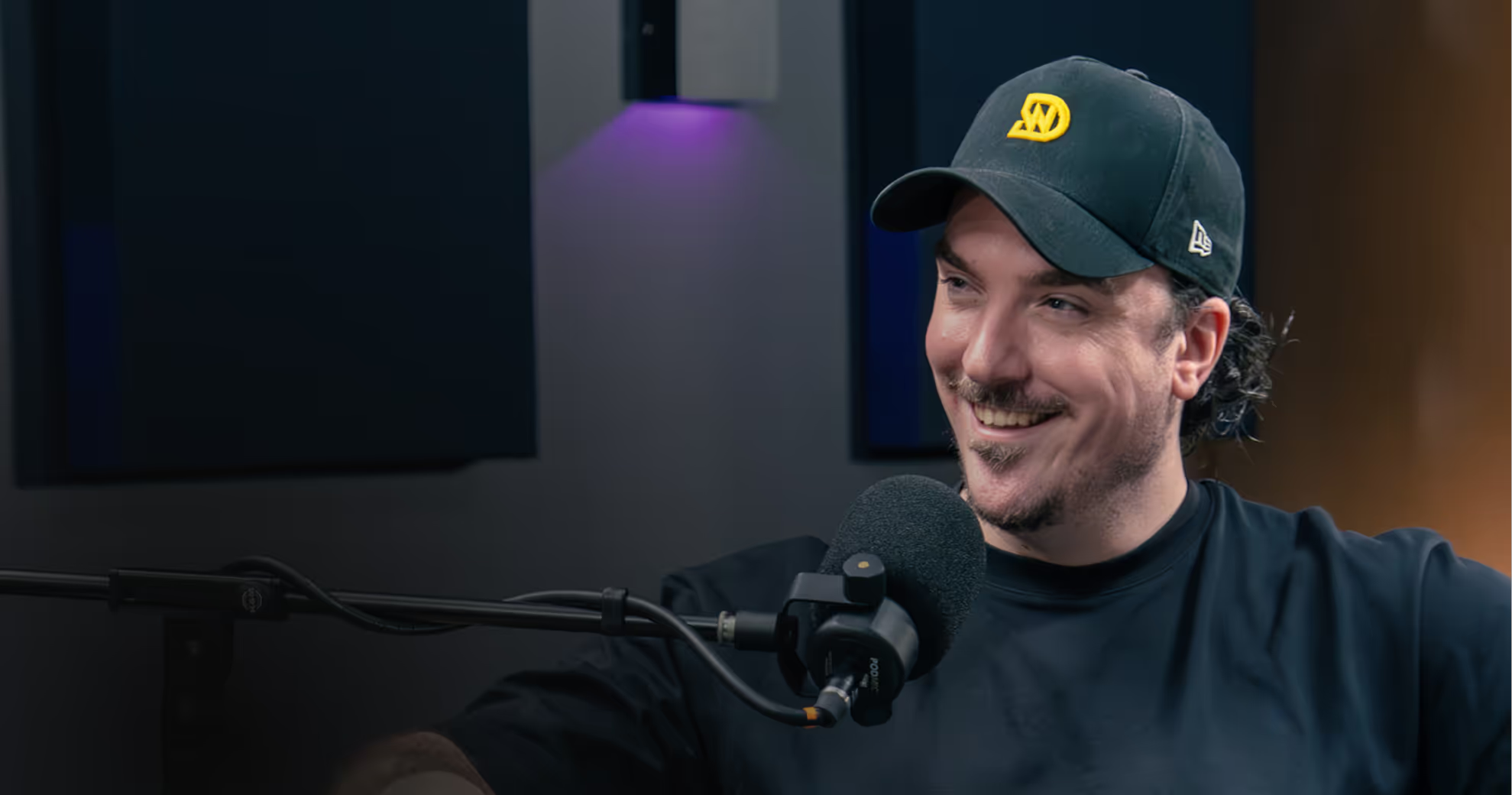
Work With Me
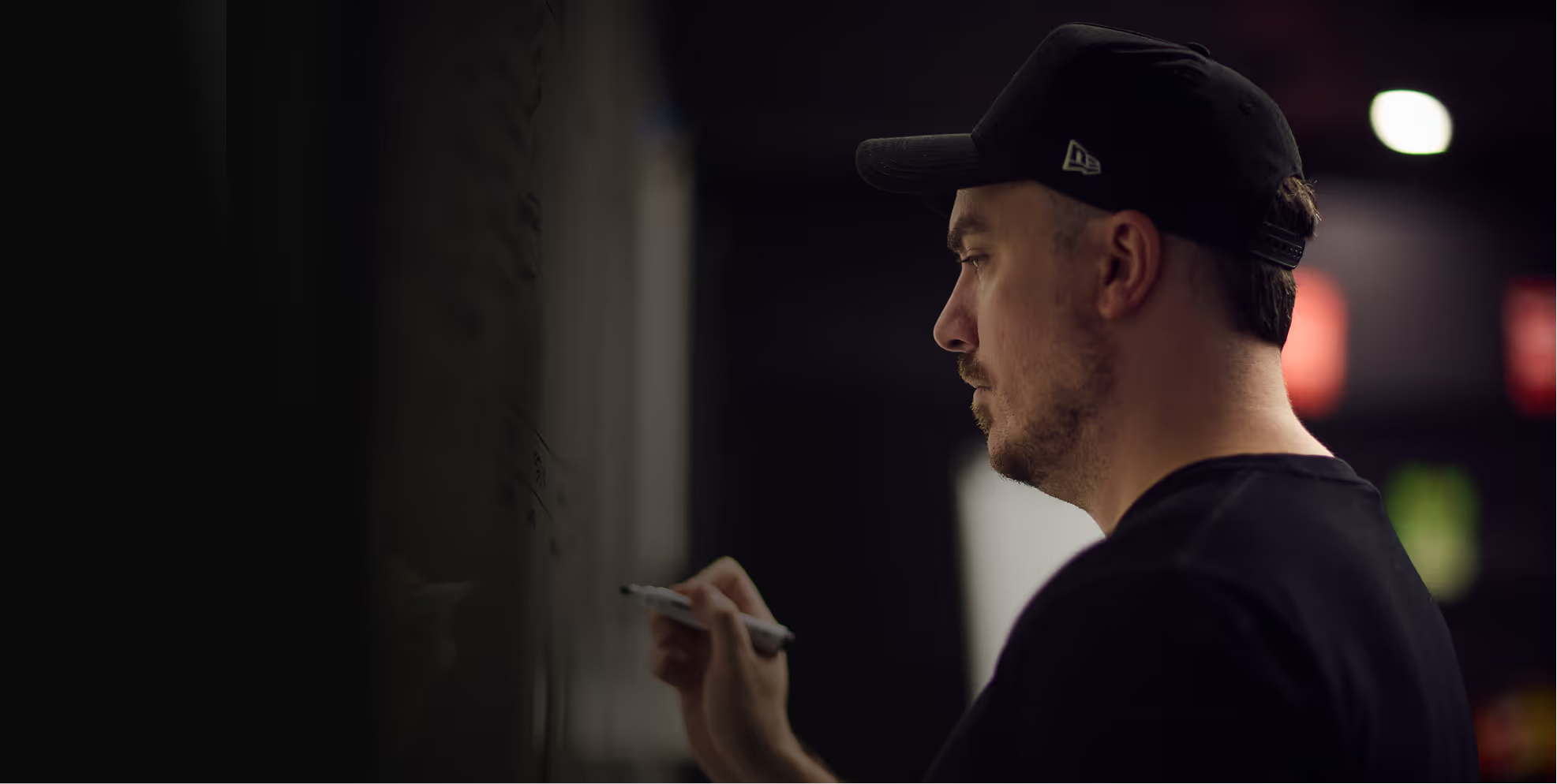
Enquire With Dain’s Team
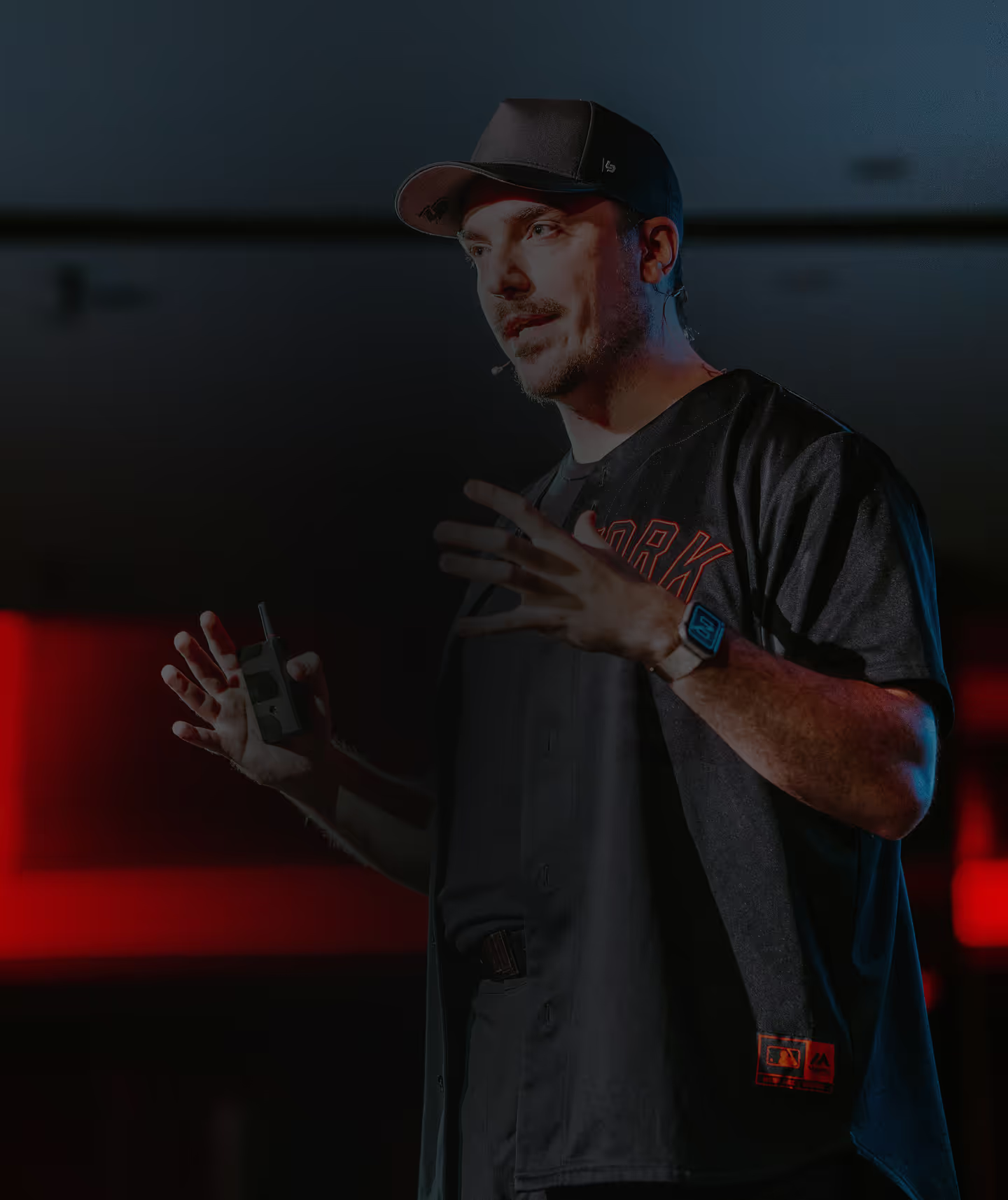
Enquire For Speaking

Let's Get You Branded
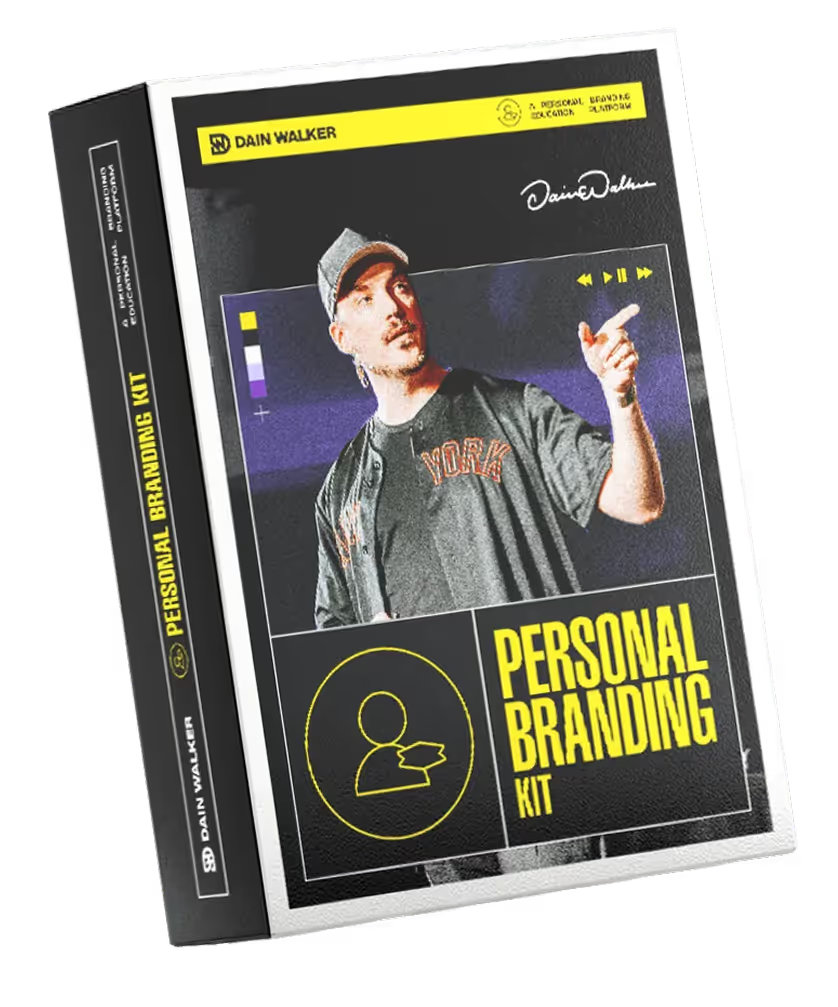
Apply to be a guest
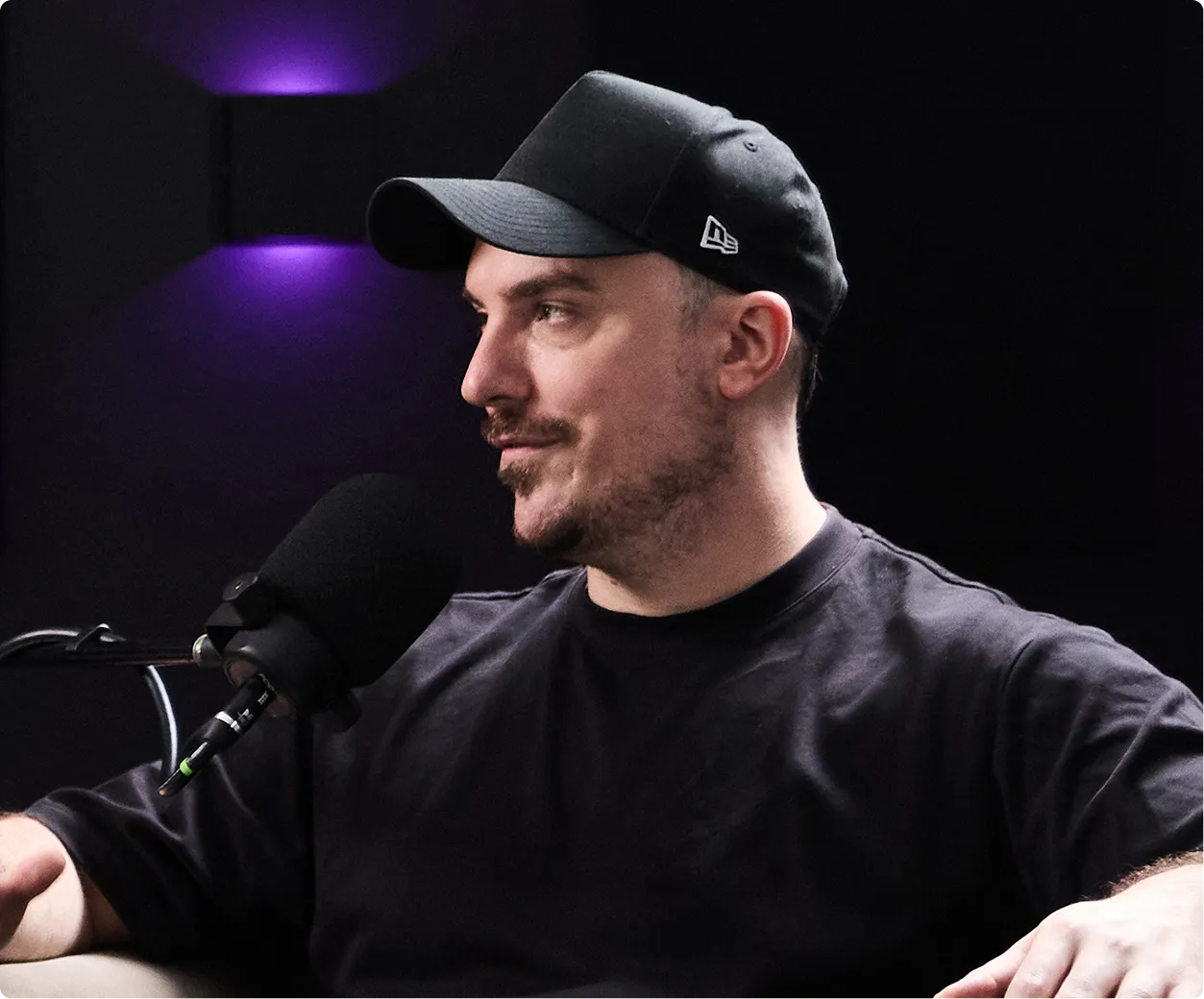
Dive into insights from industry leaders and experts.
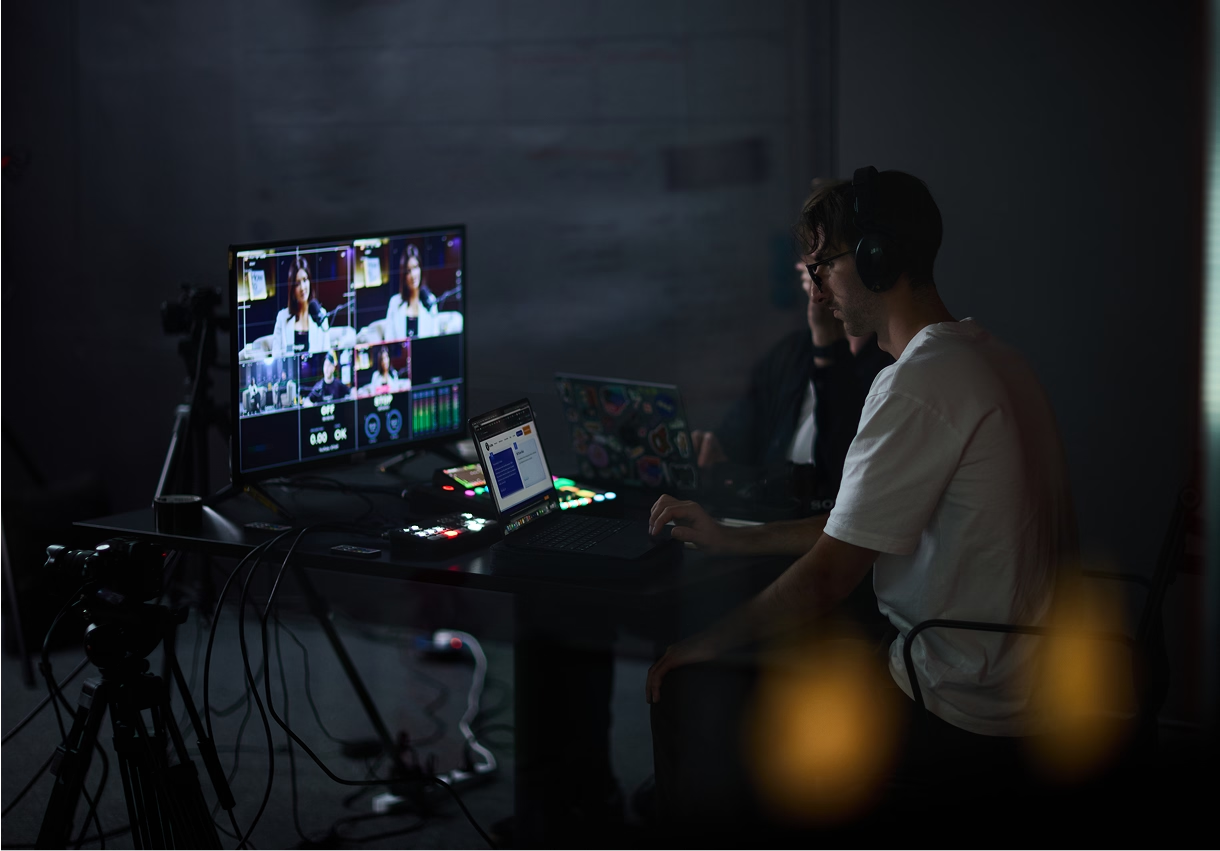
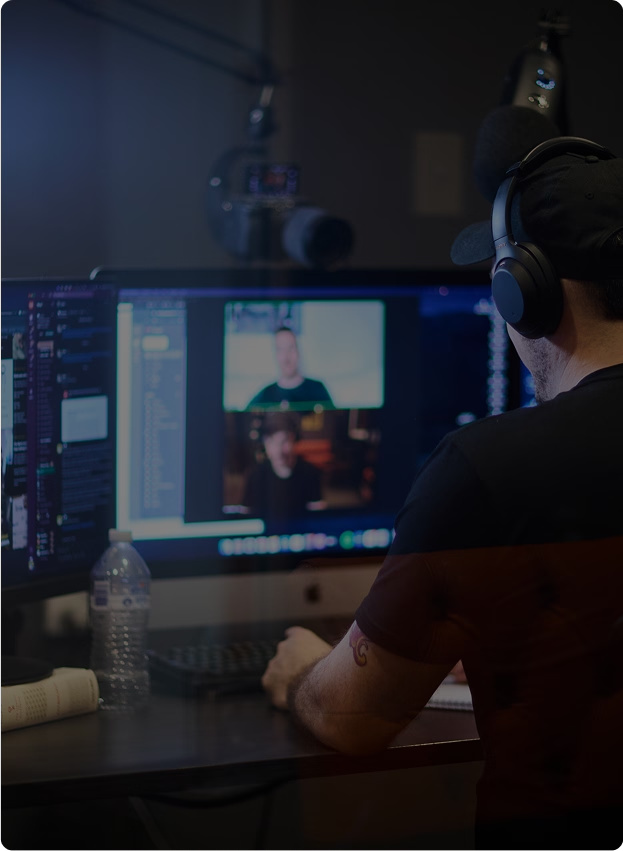
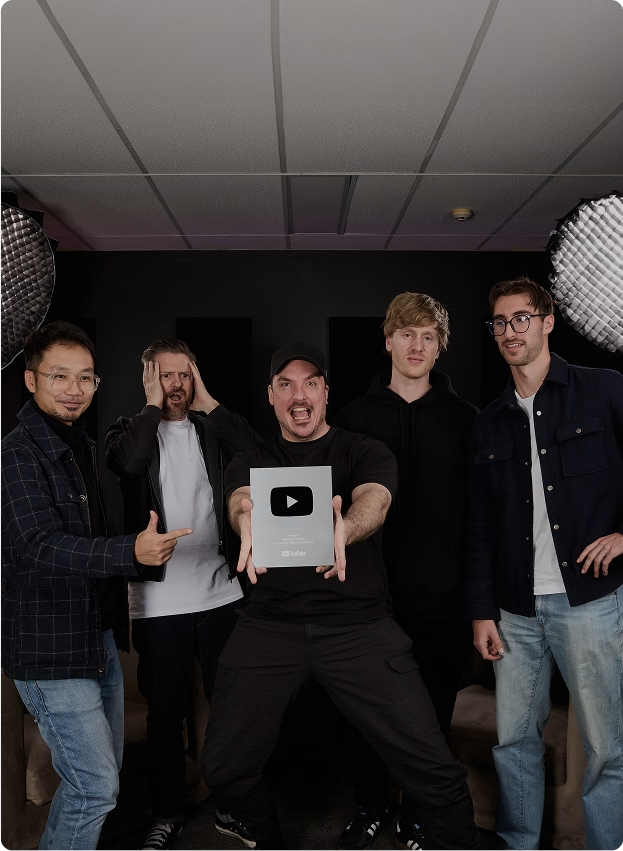
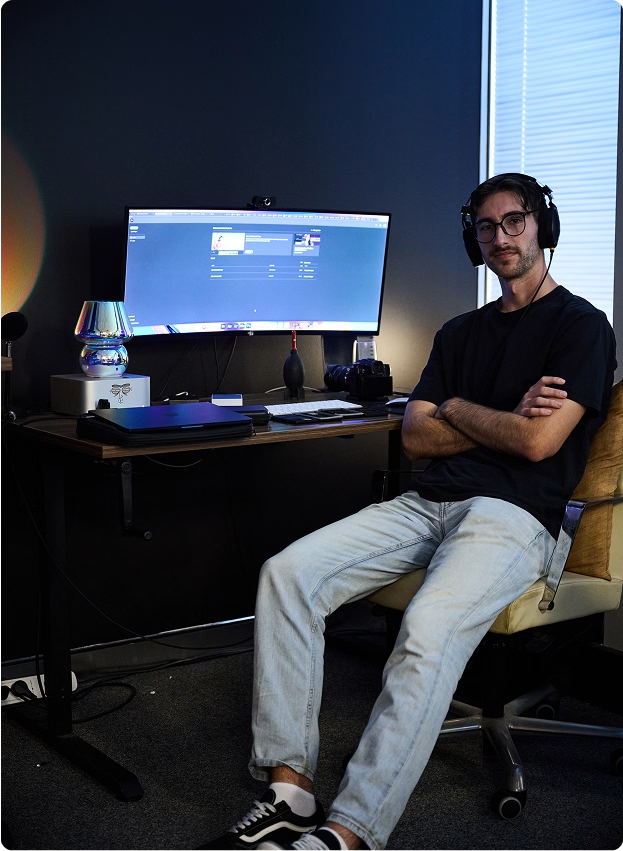
Stream now
Dive into expert advice and industry trends.
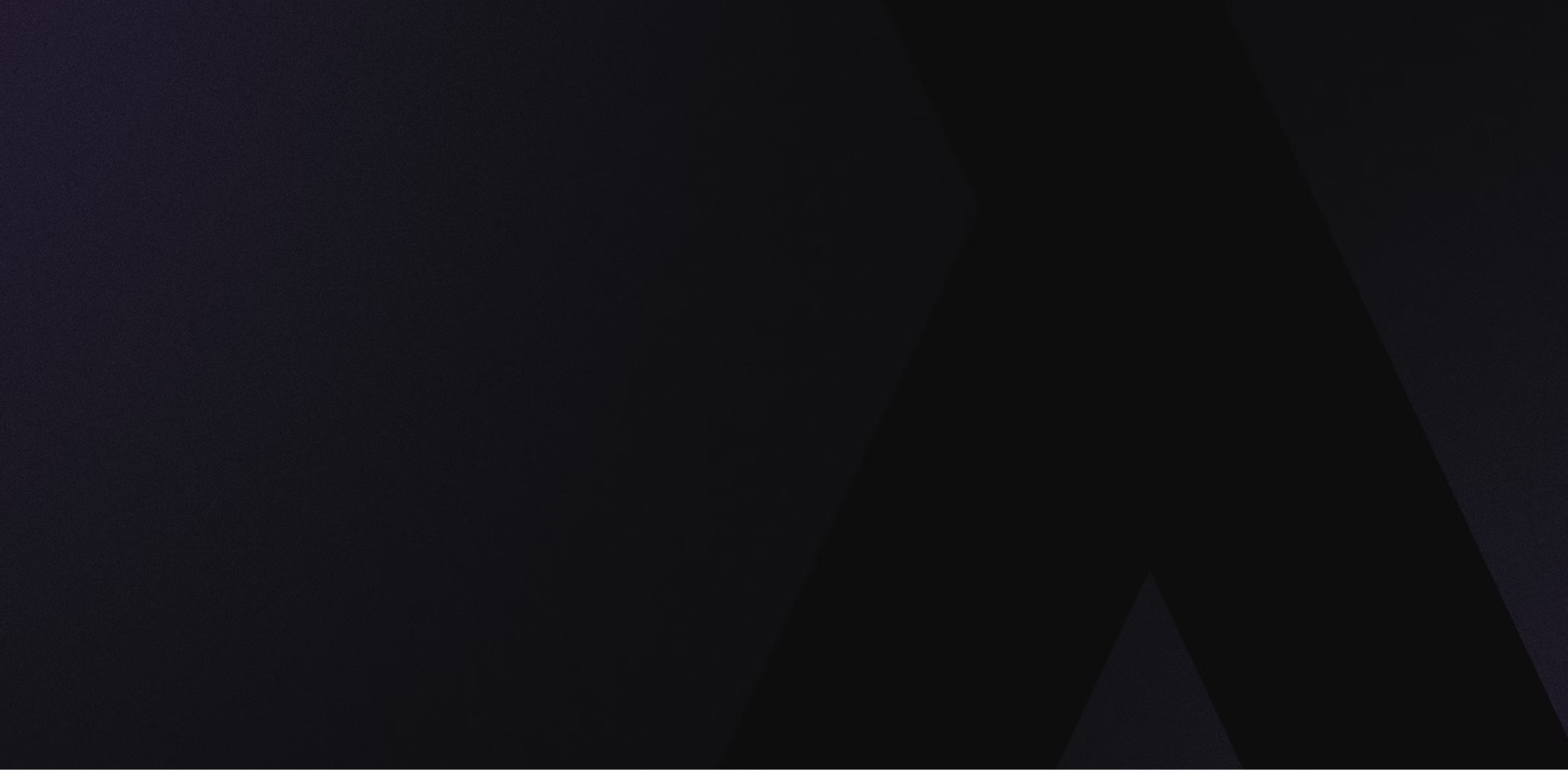

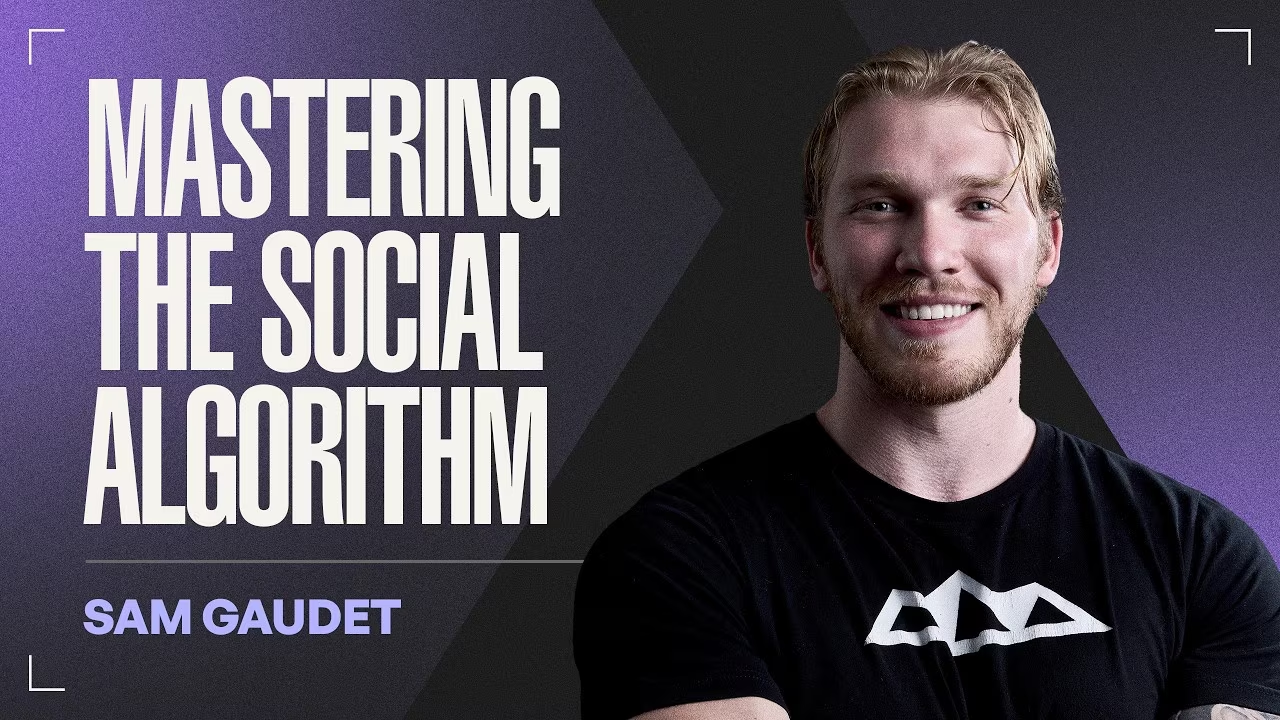
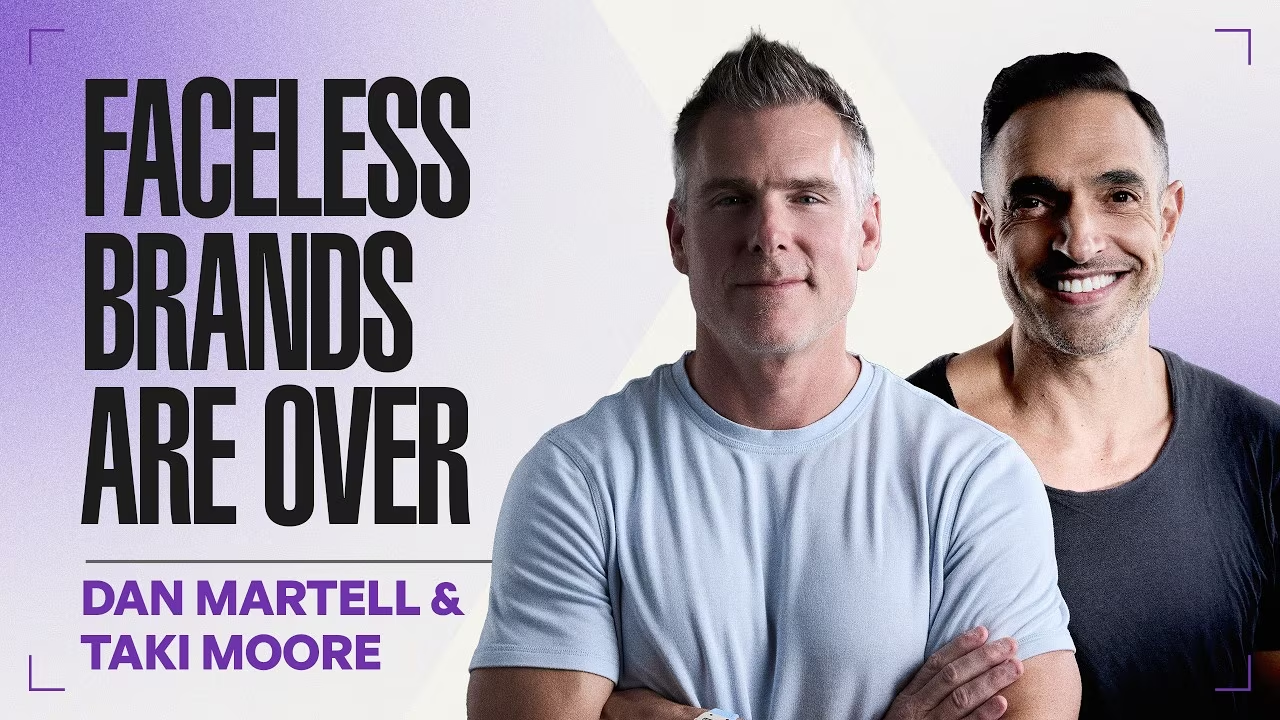
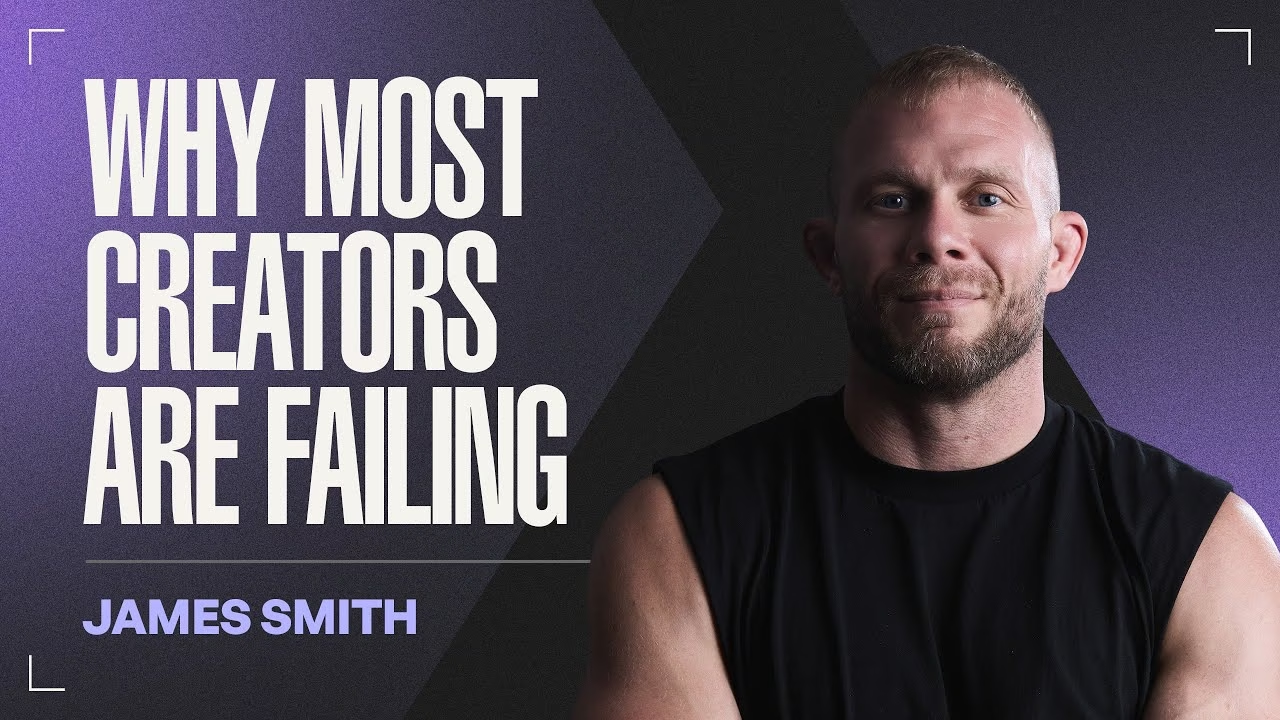
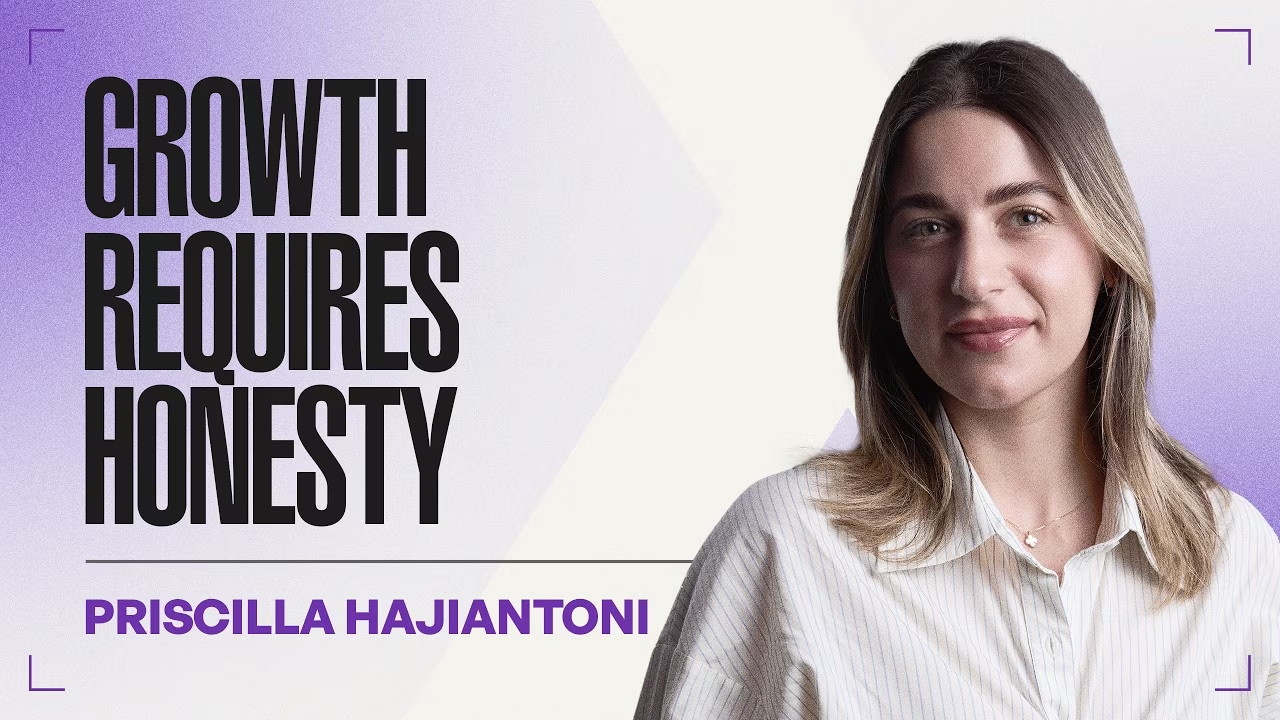
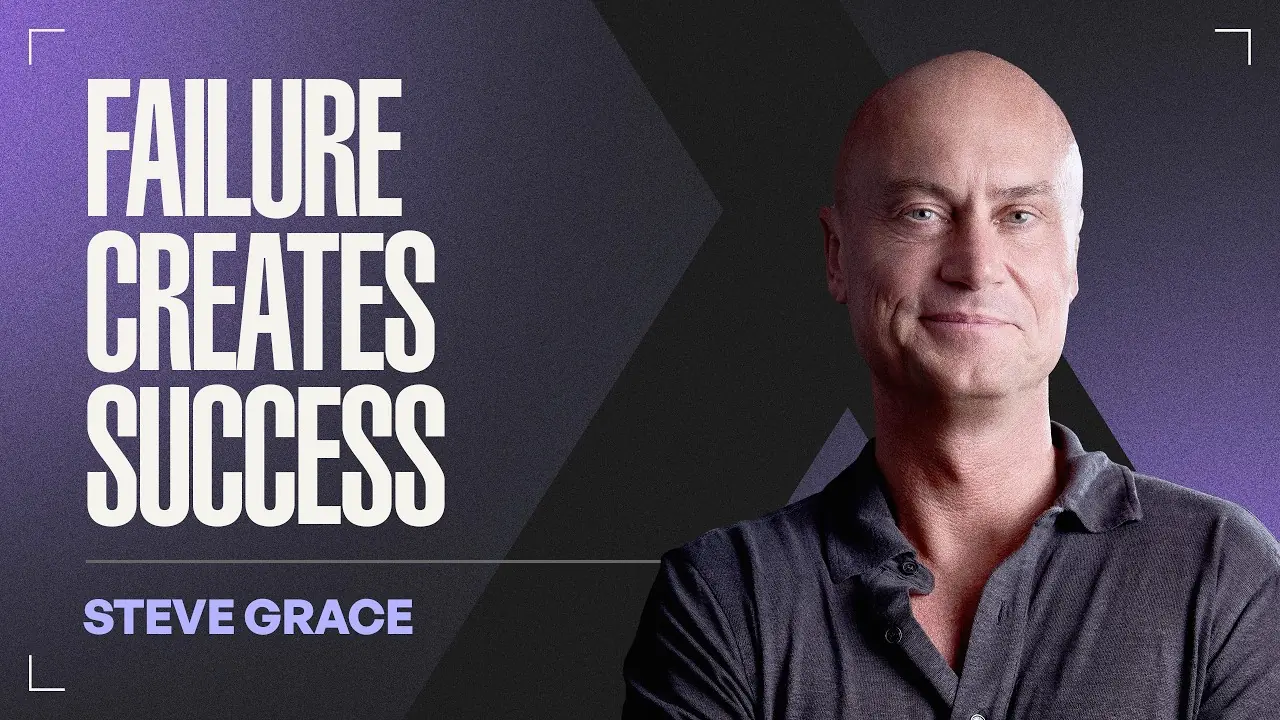
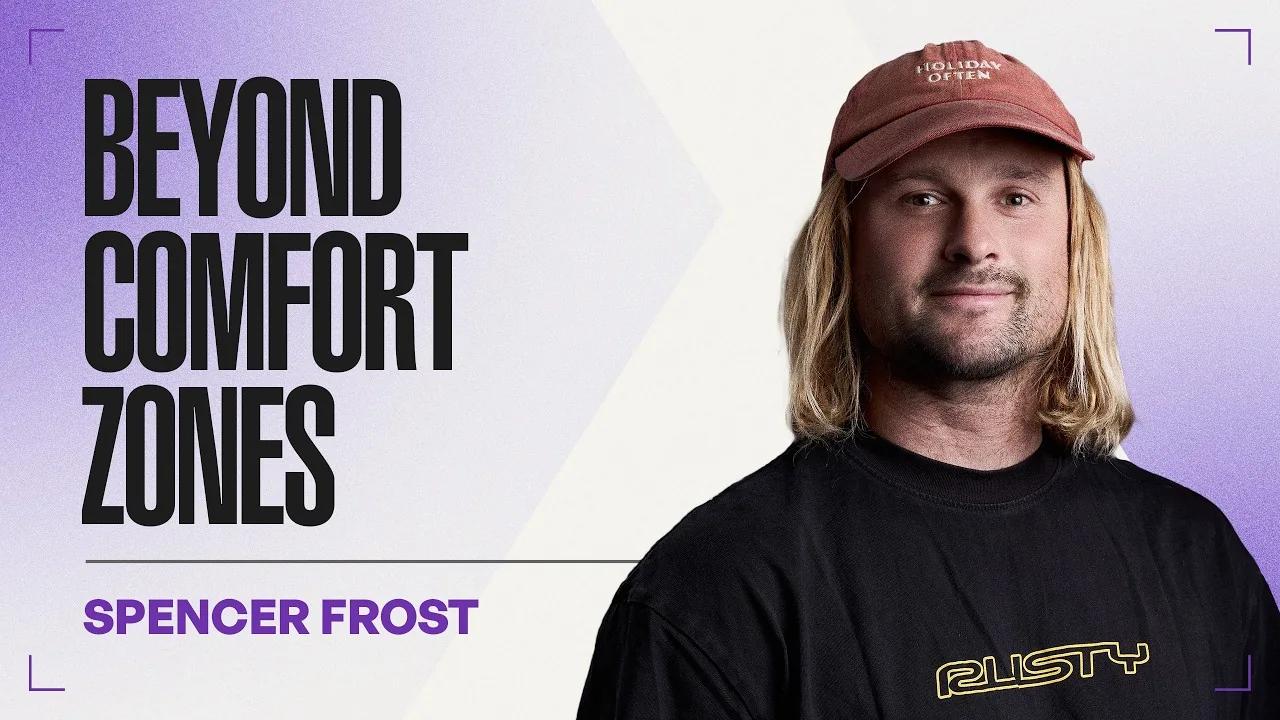
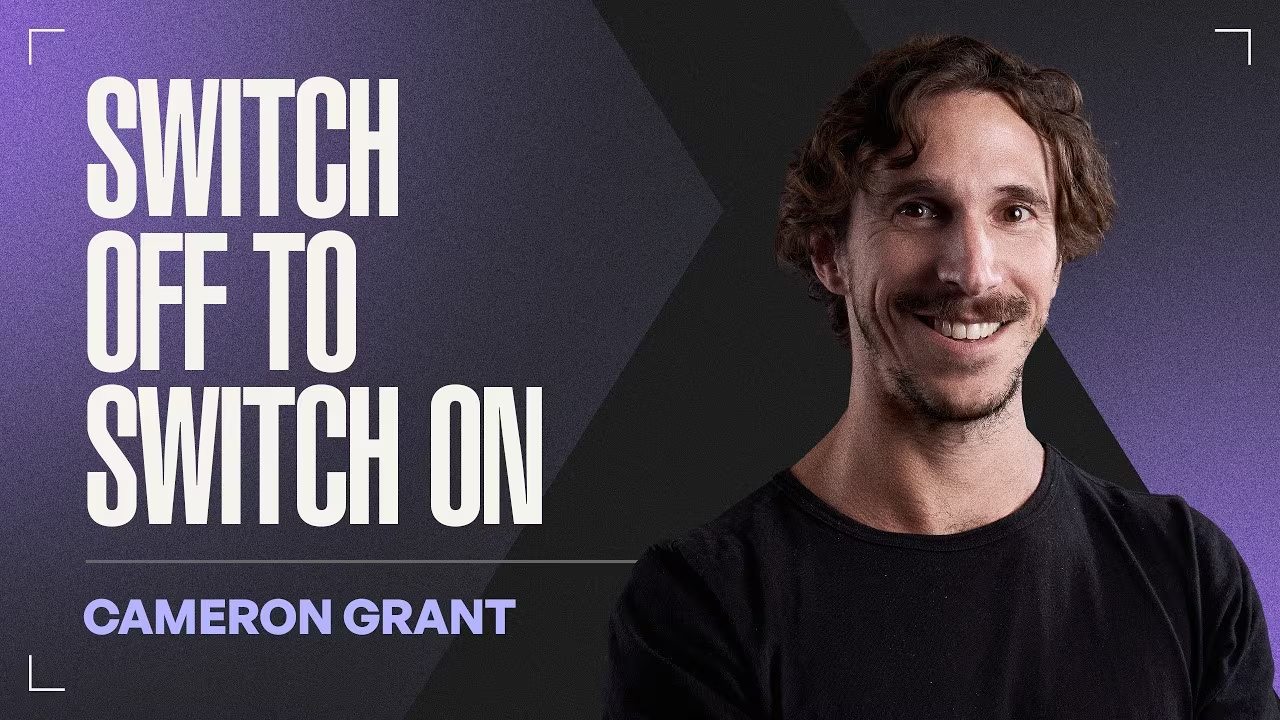
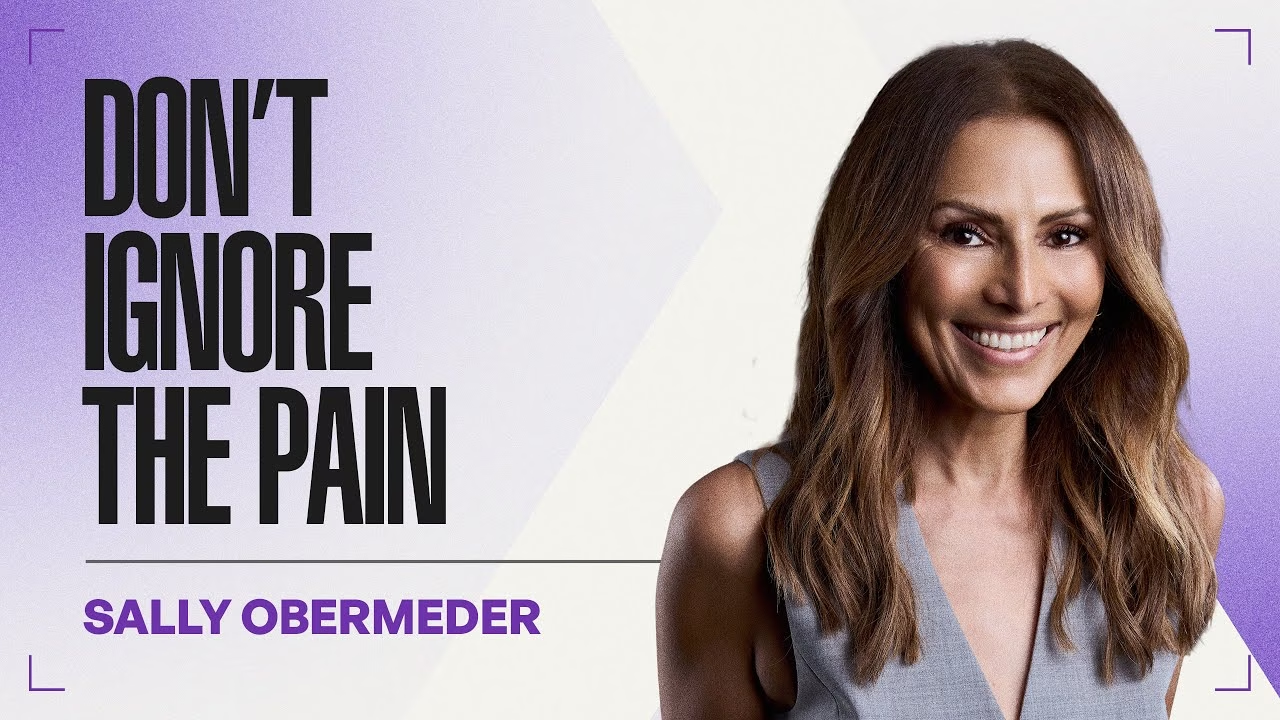
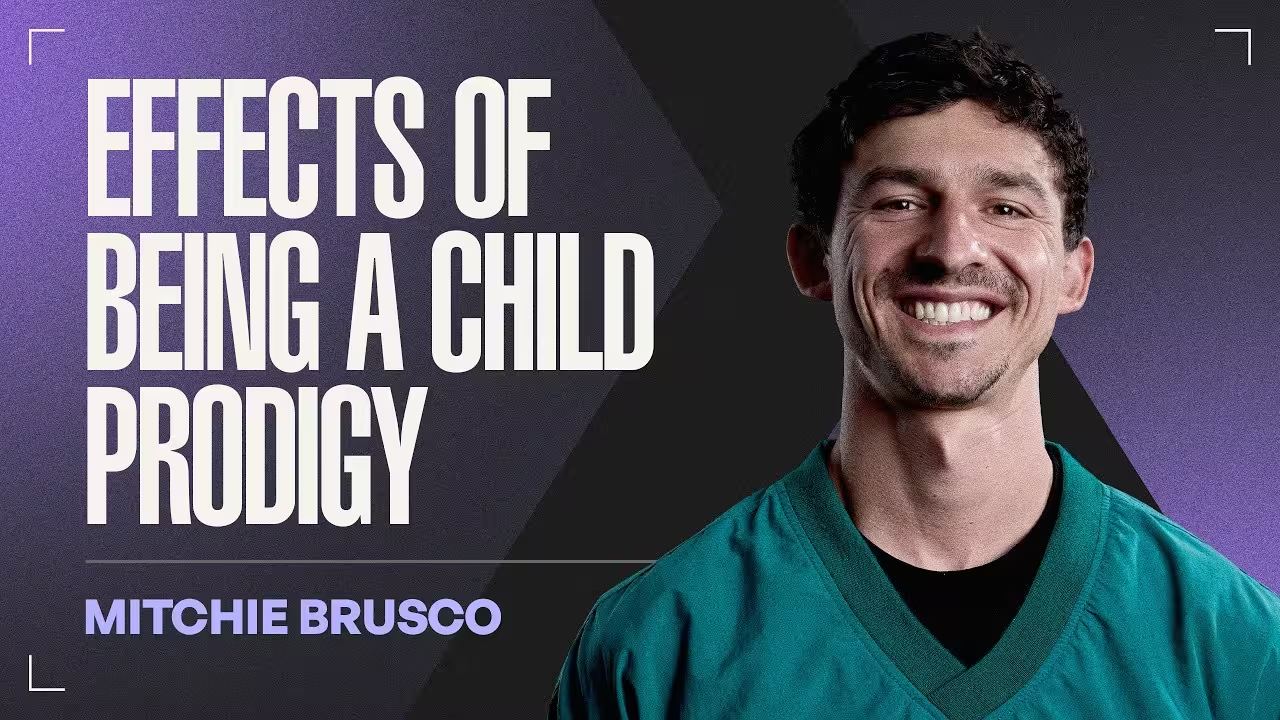
.avif)
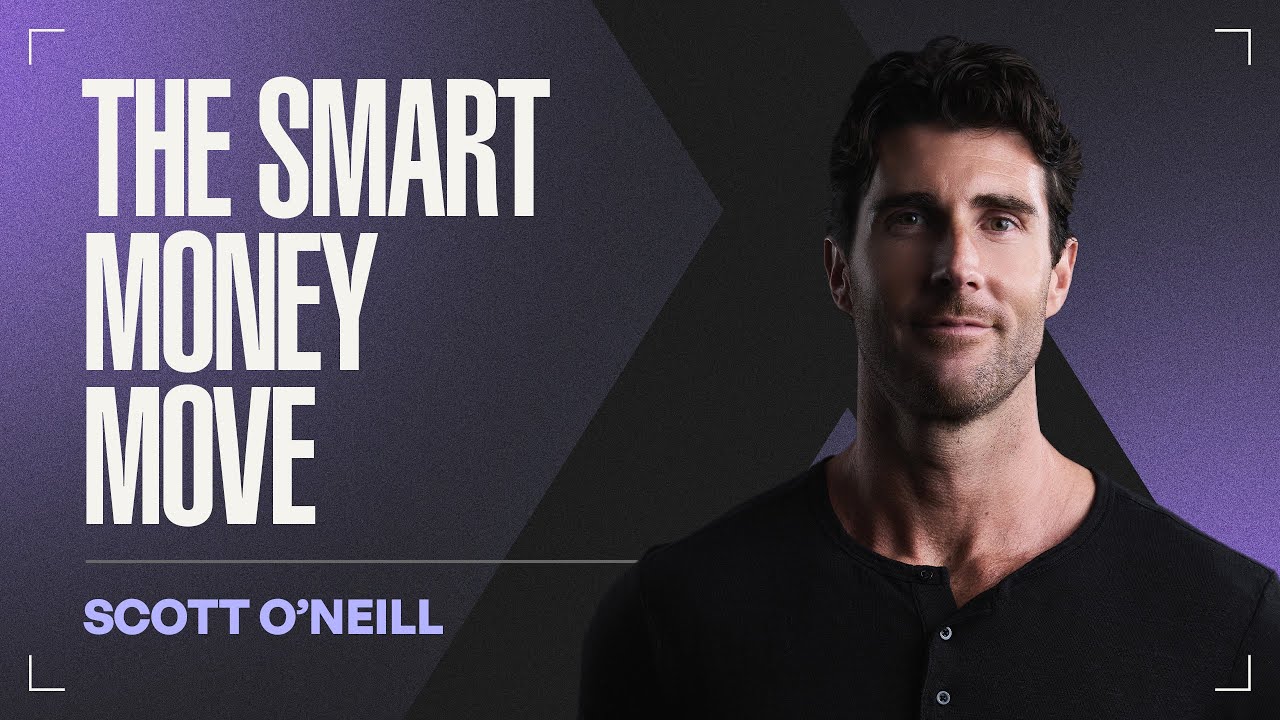
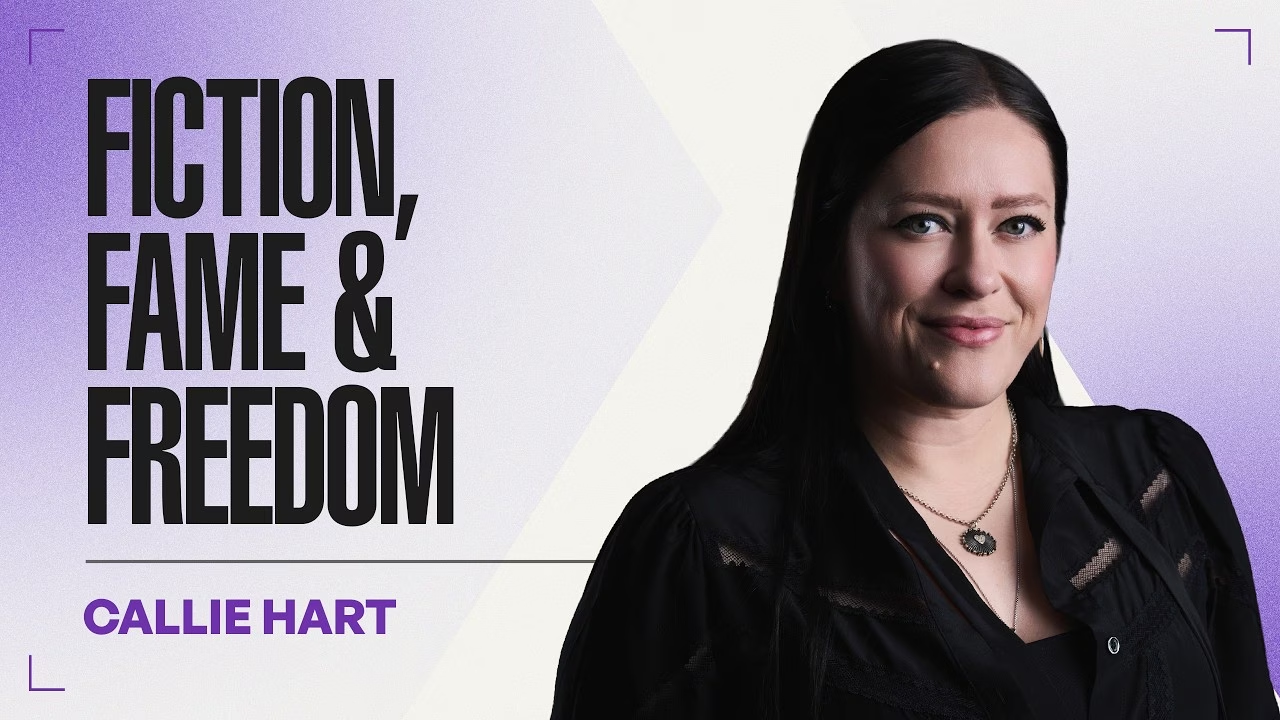

.avif)
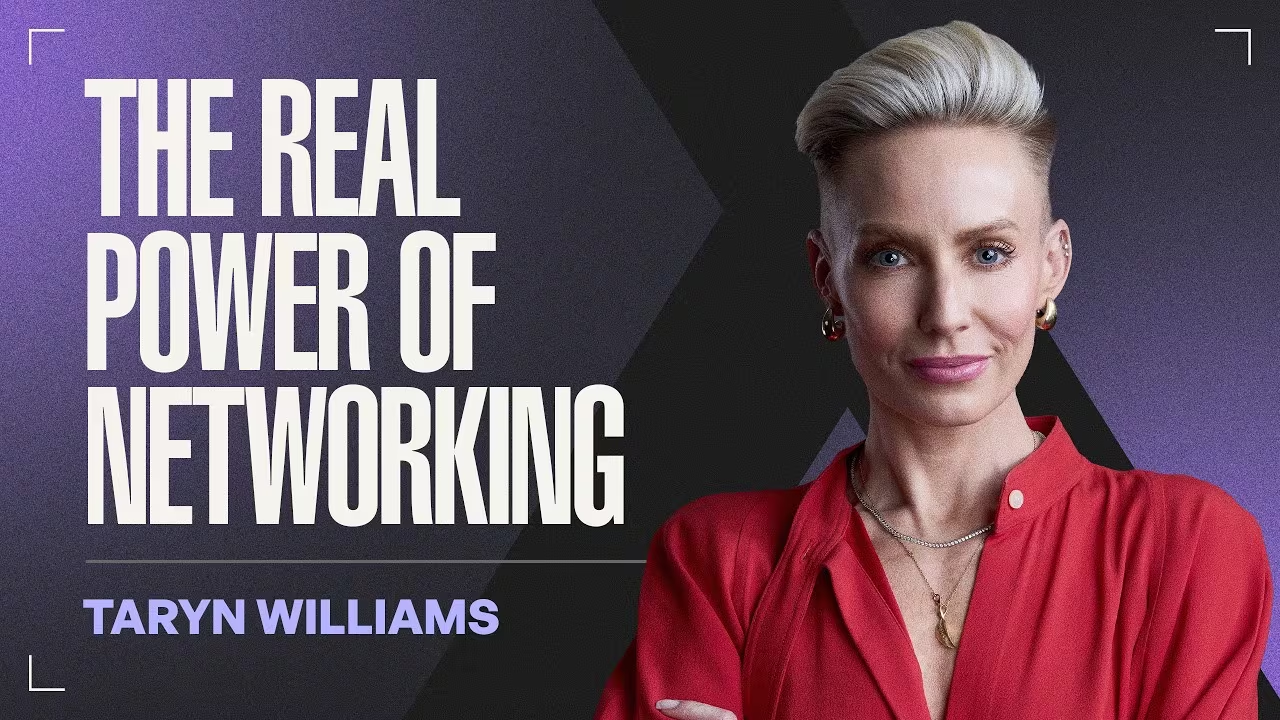

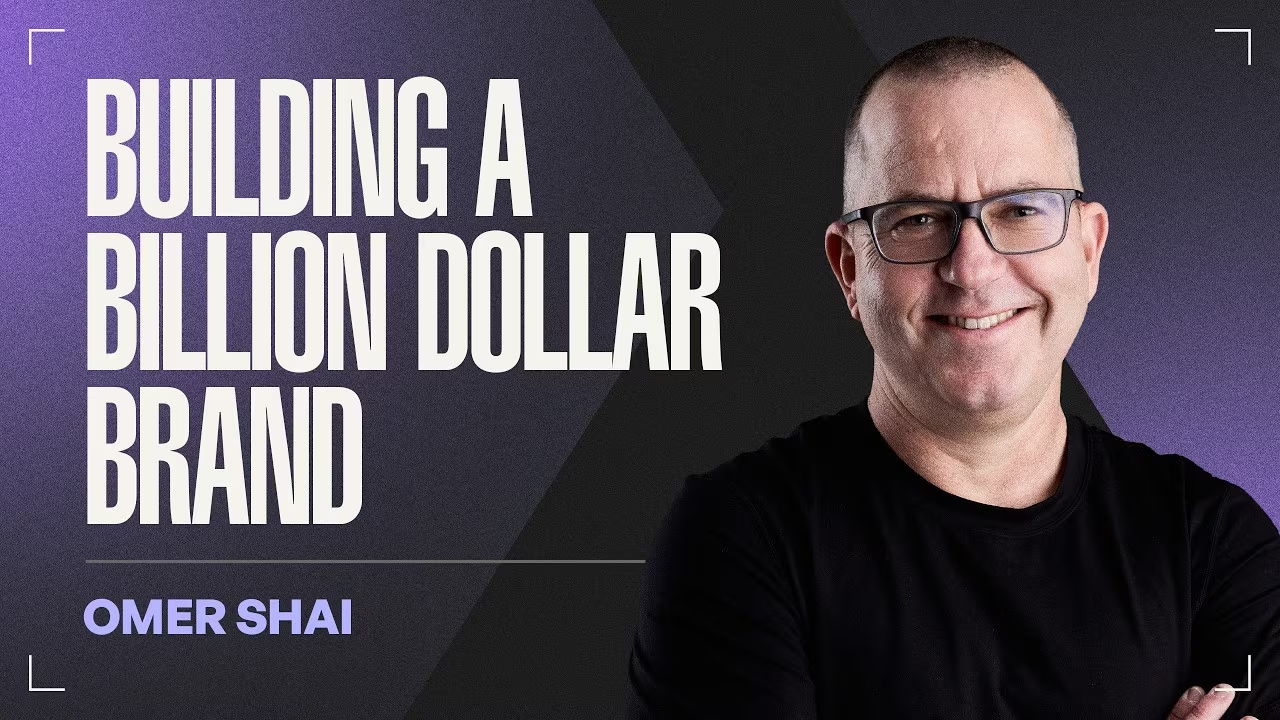
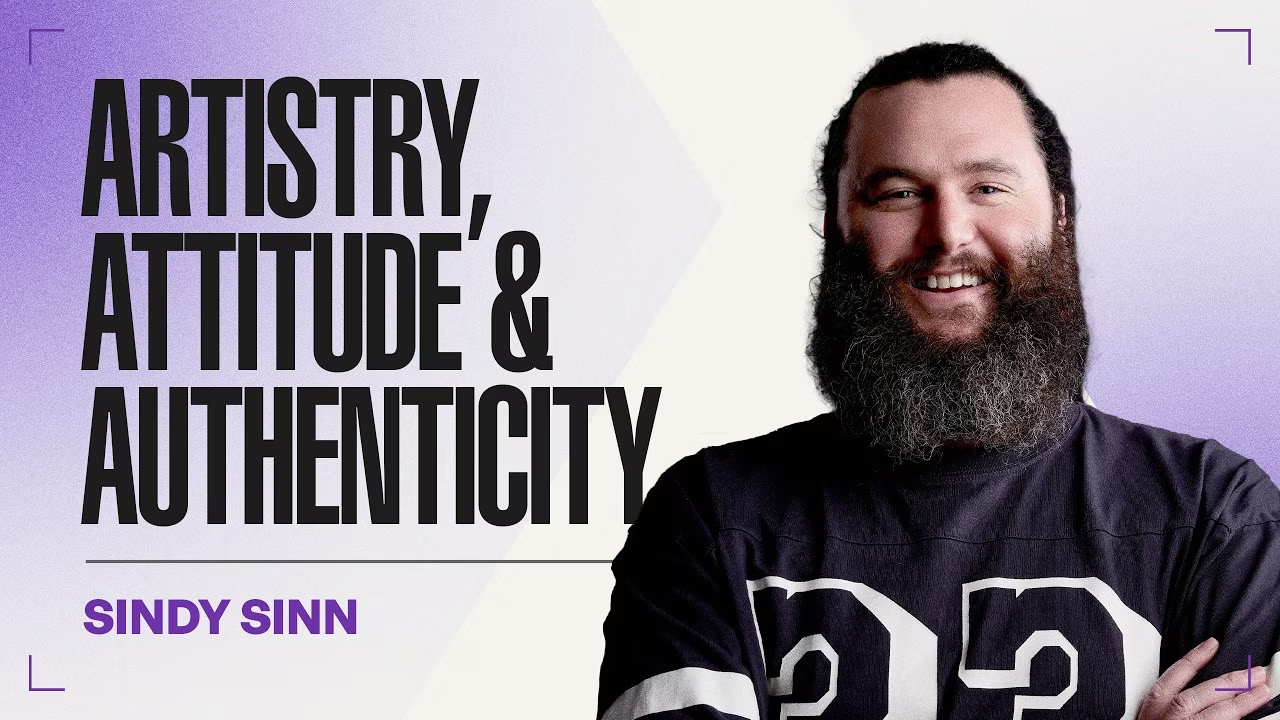
%20(1).avif)
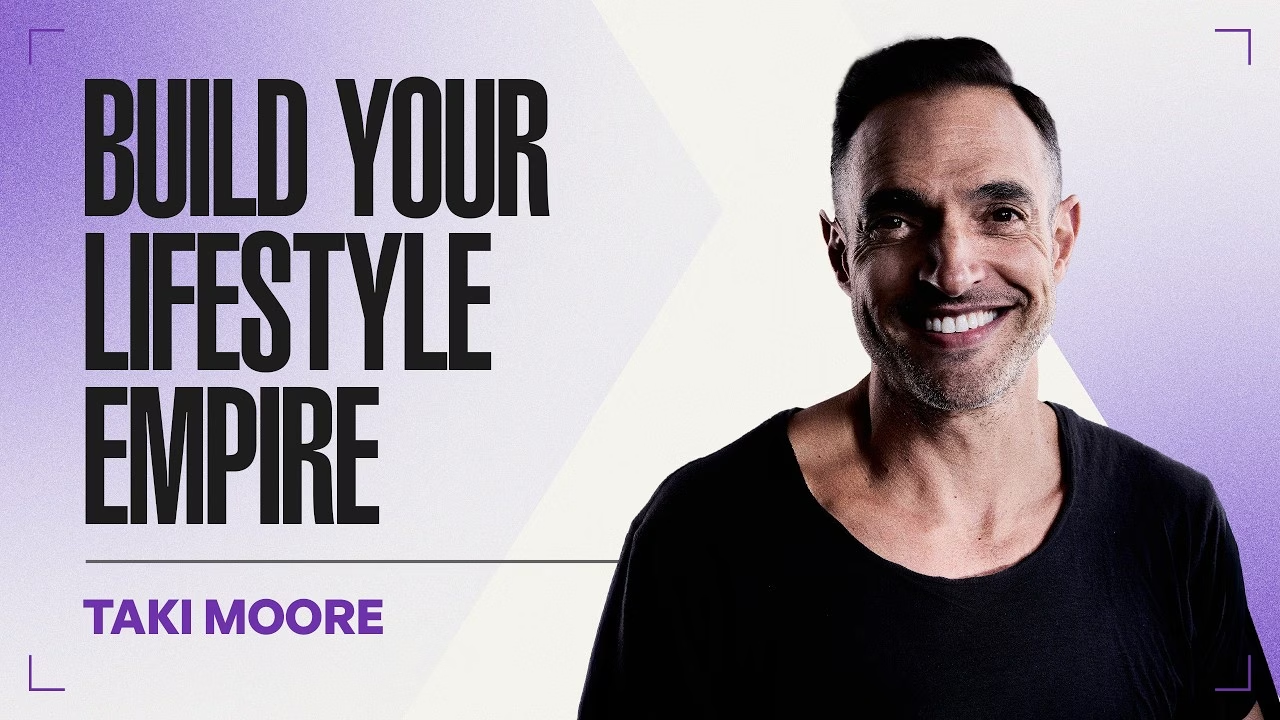
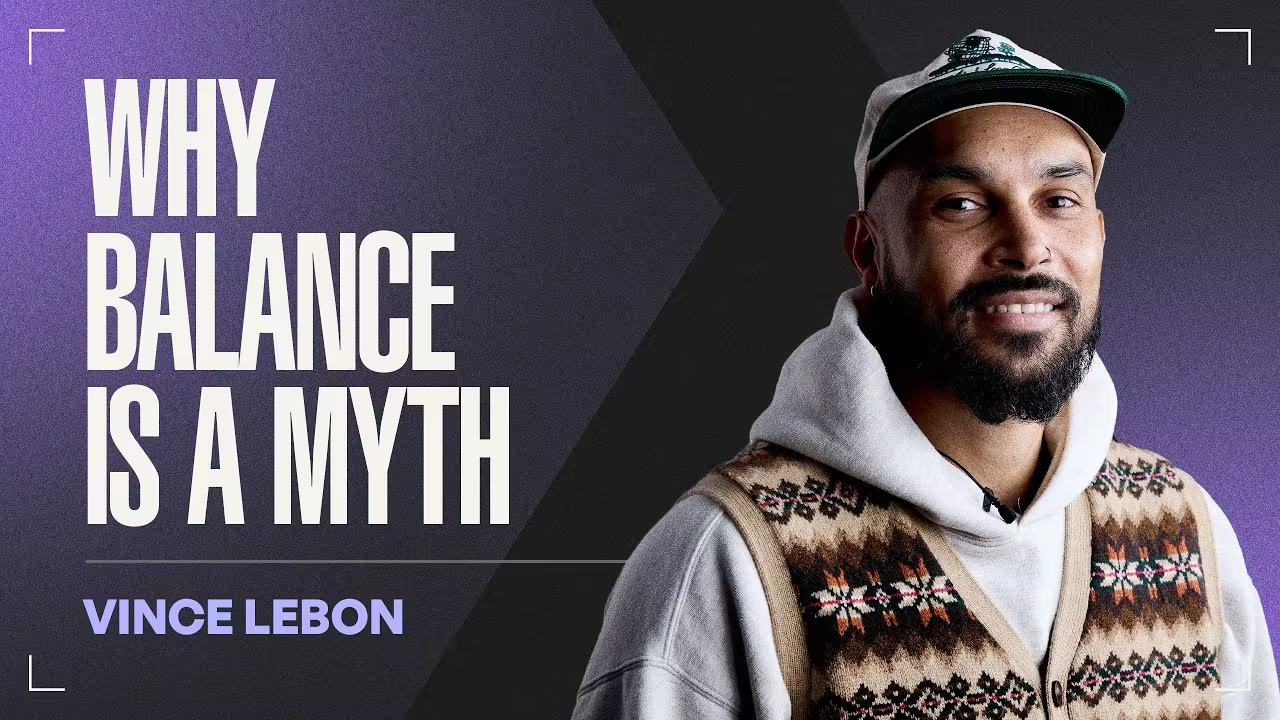
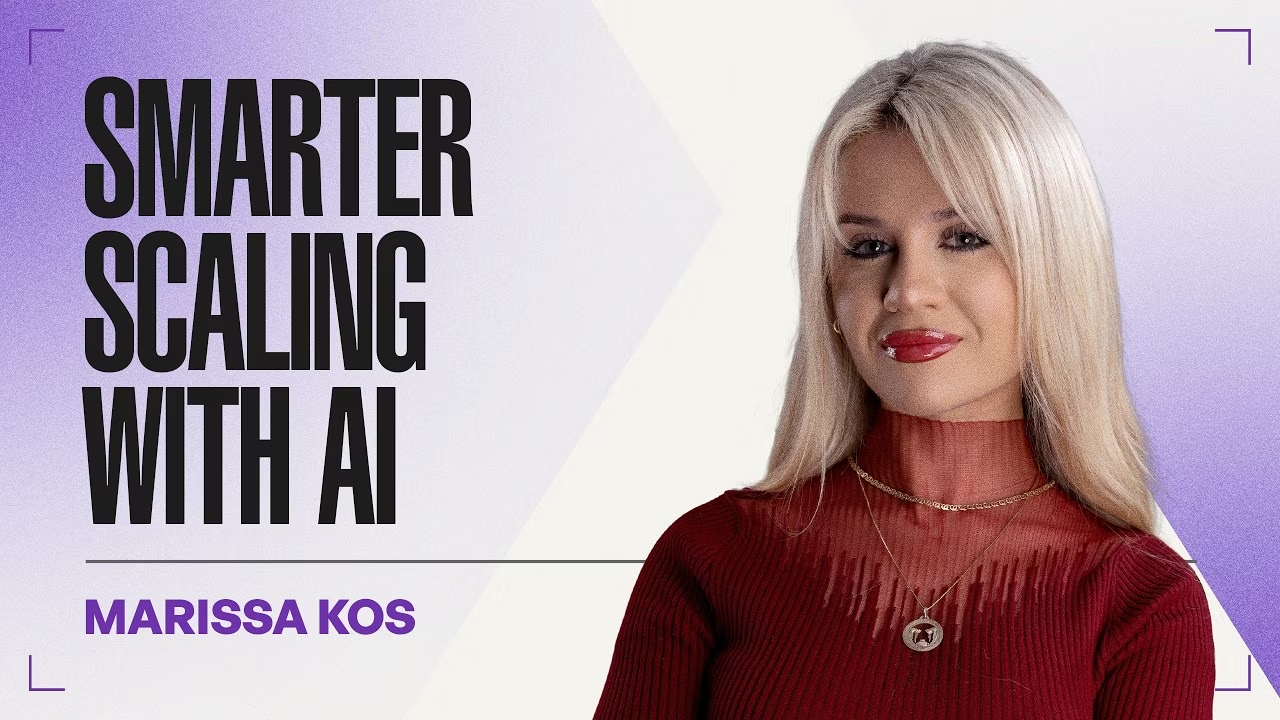
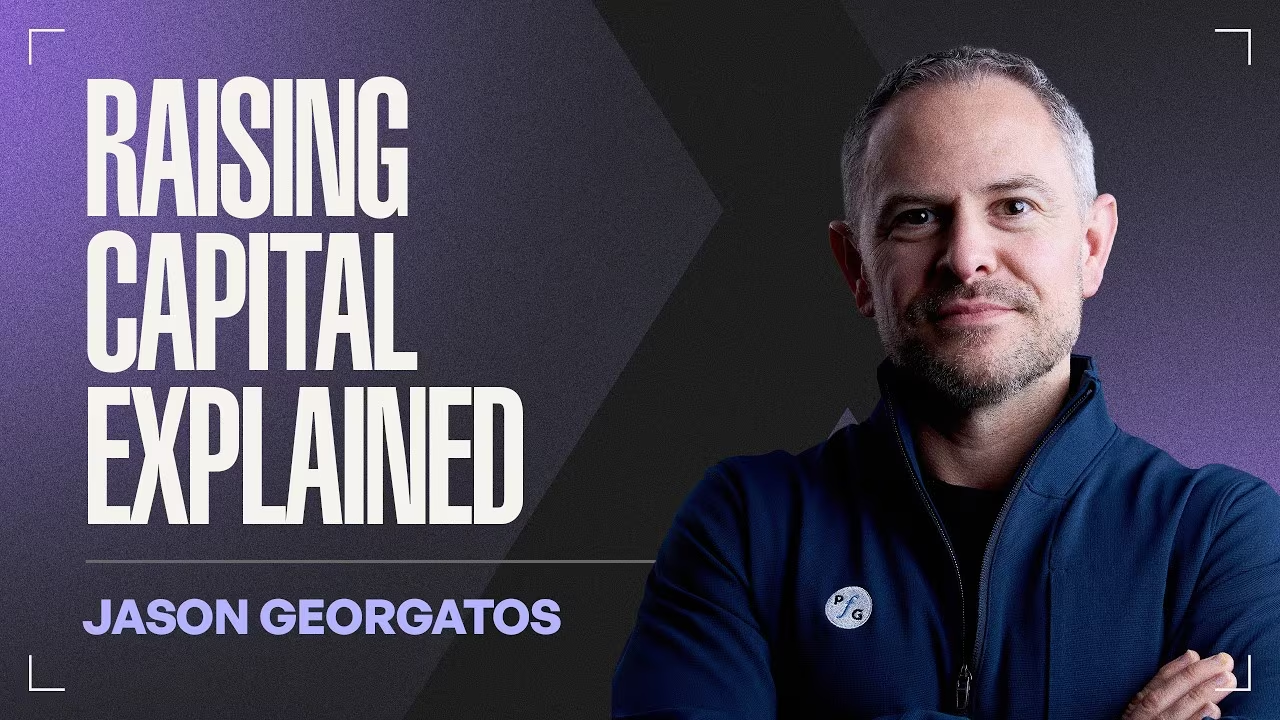
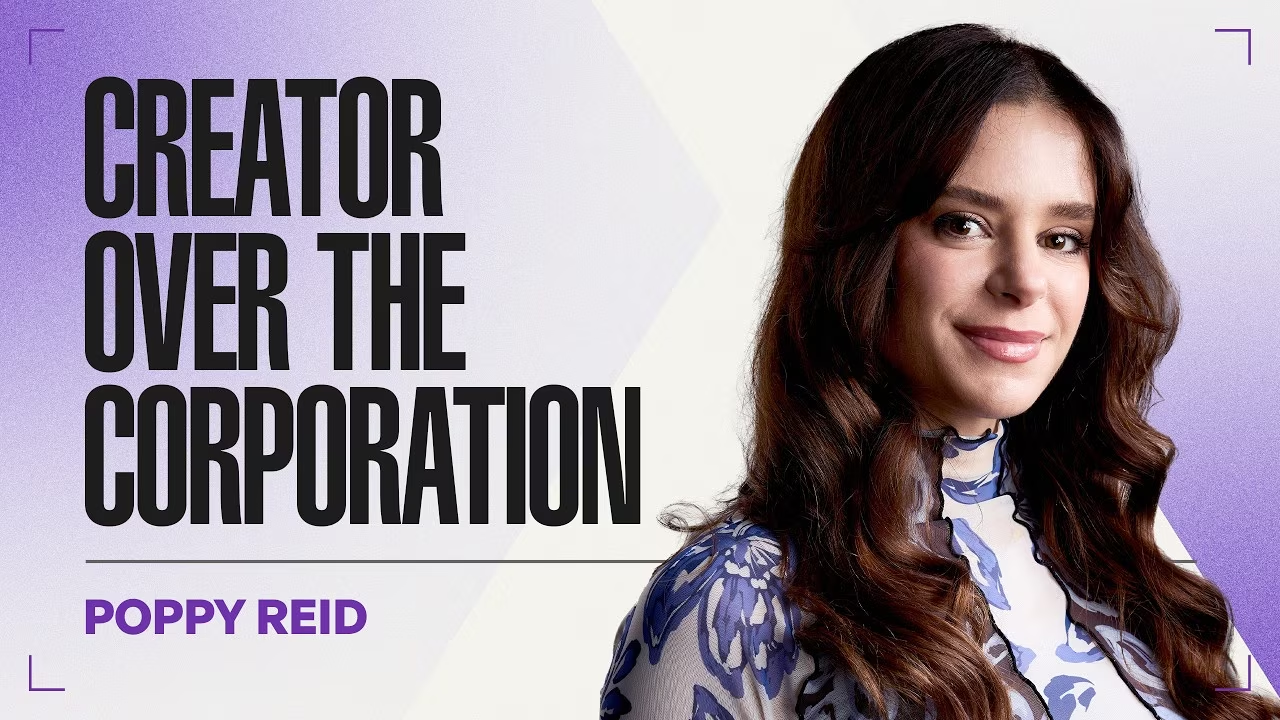
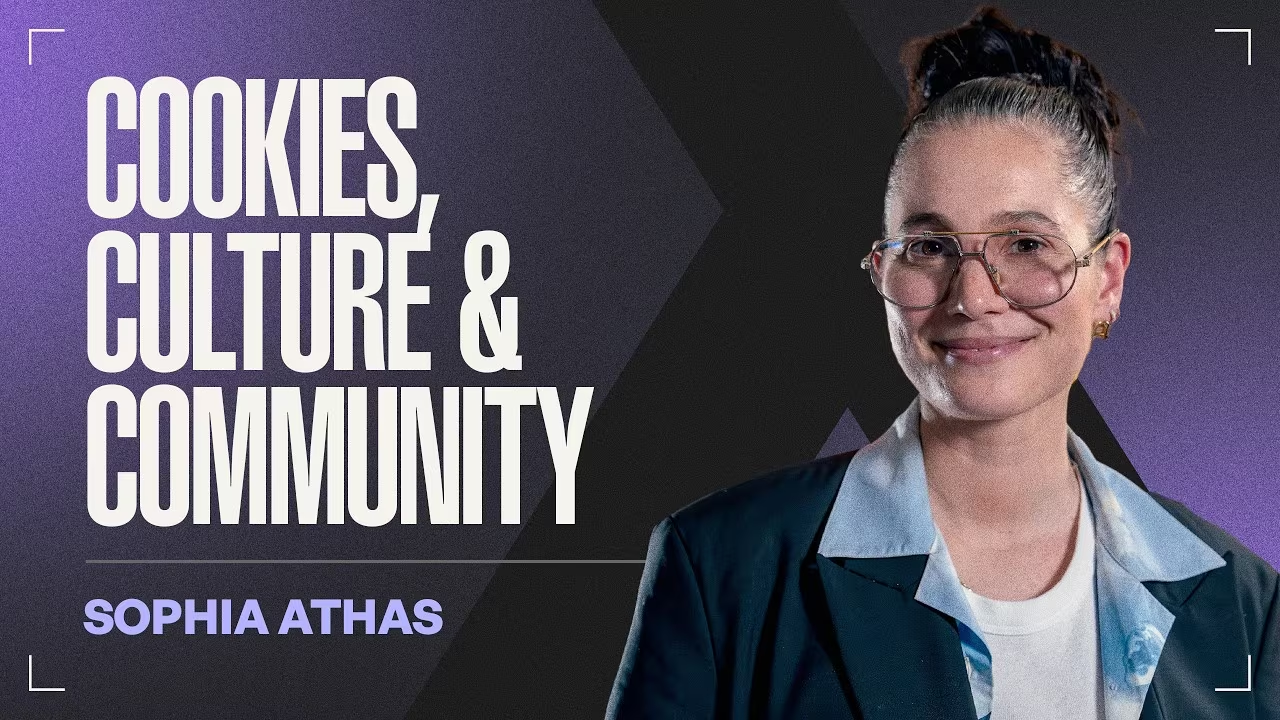
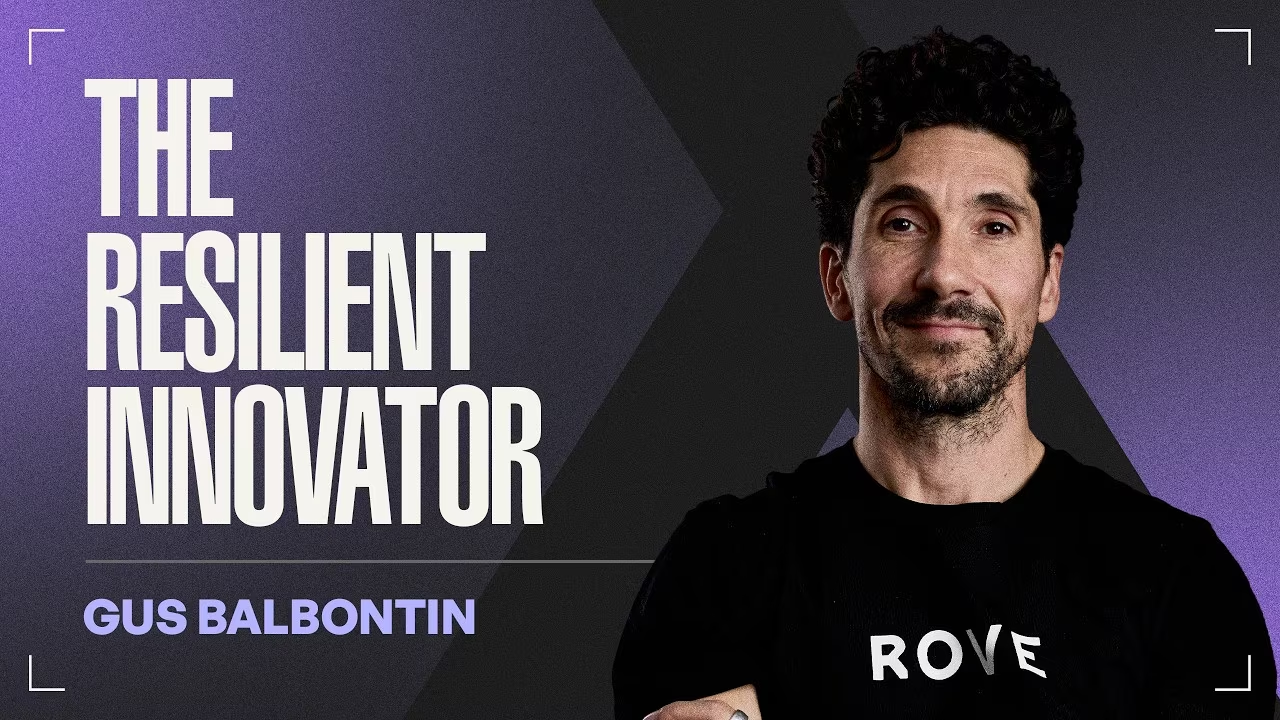
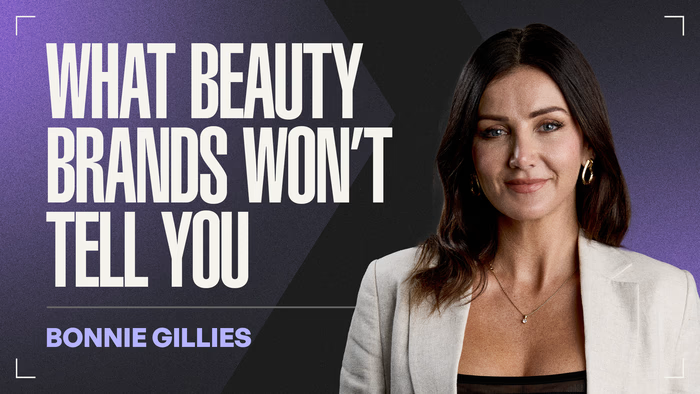


.avif)

